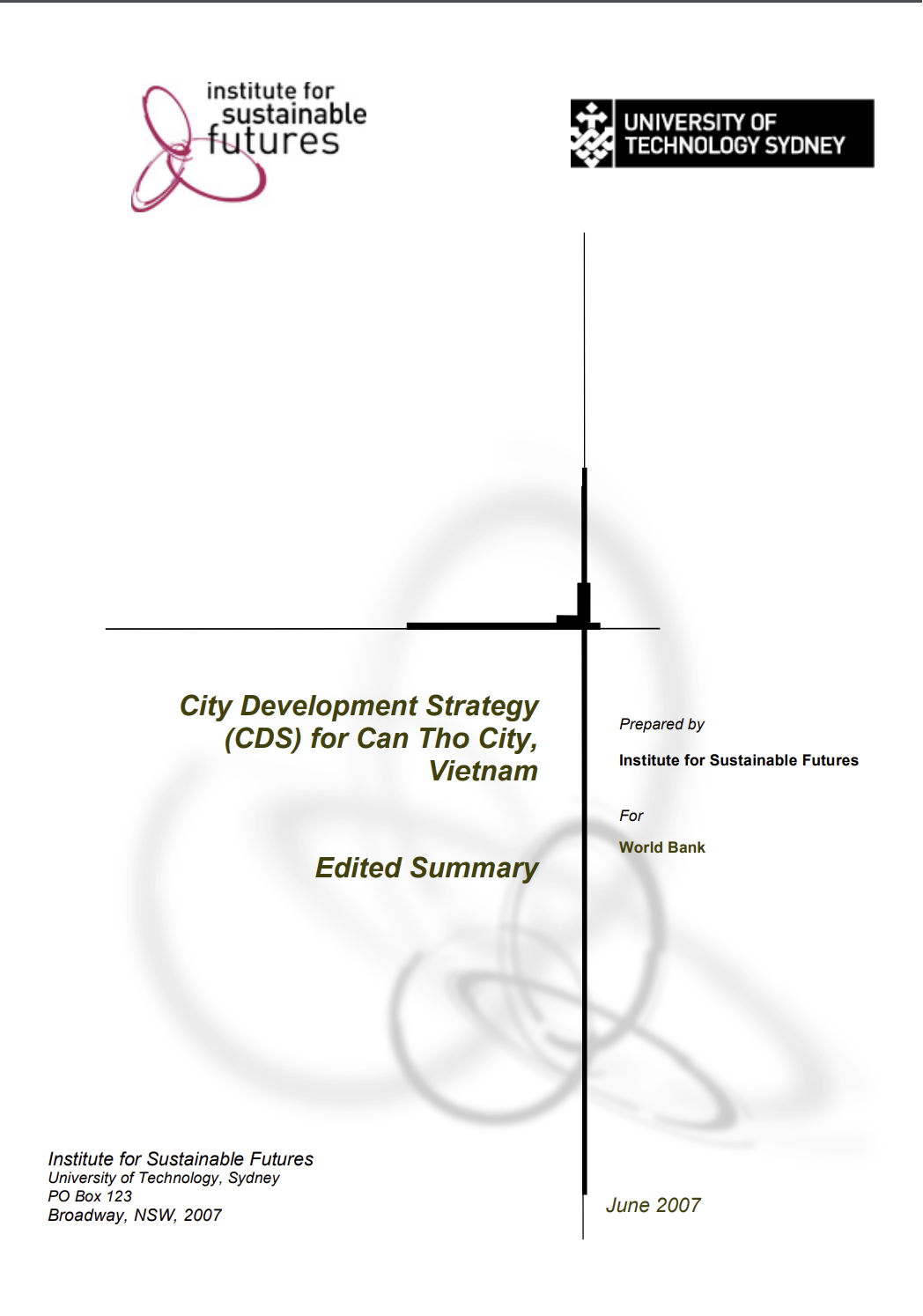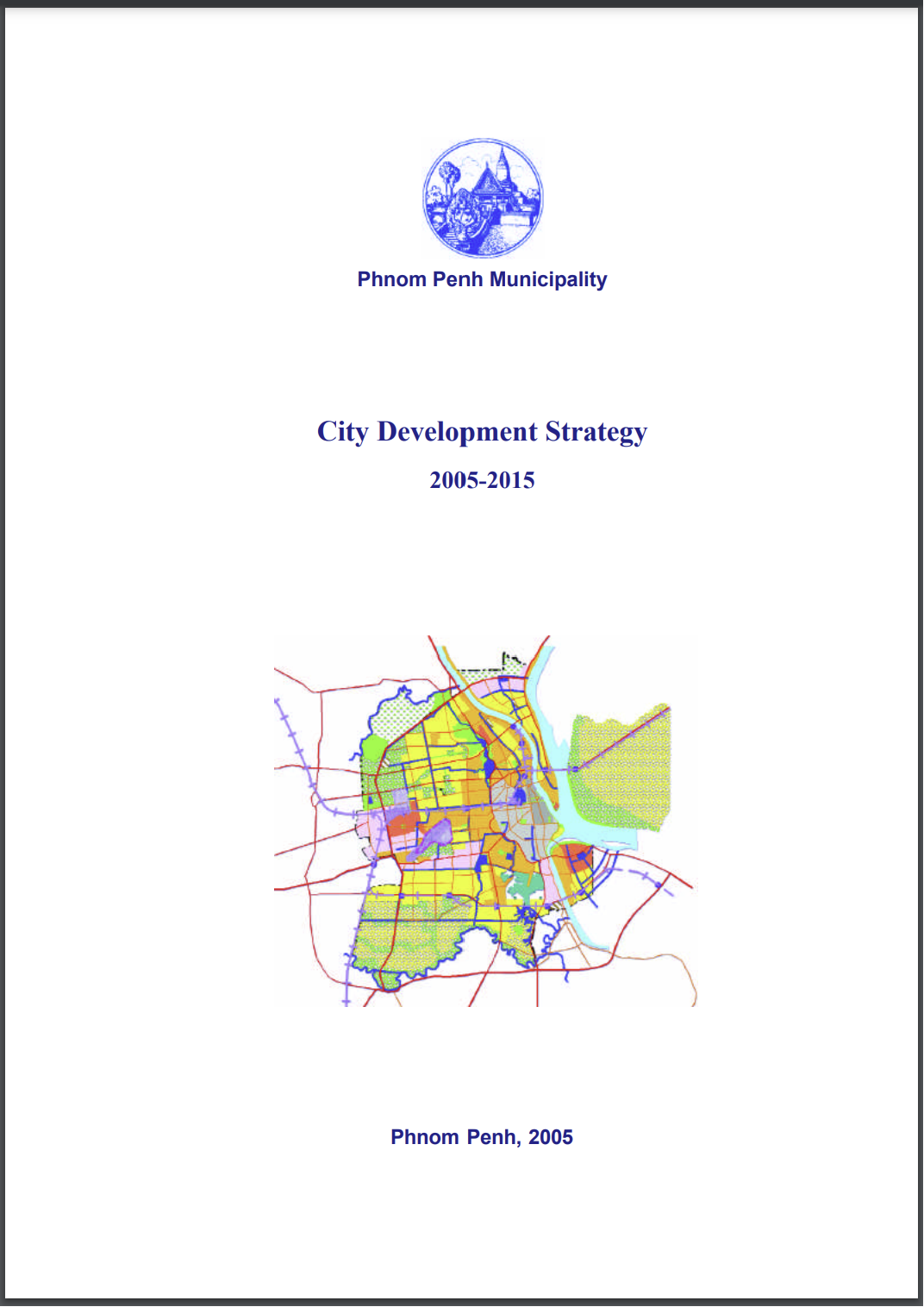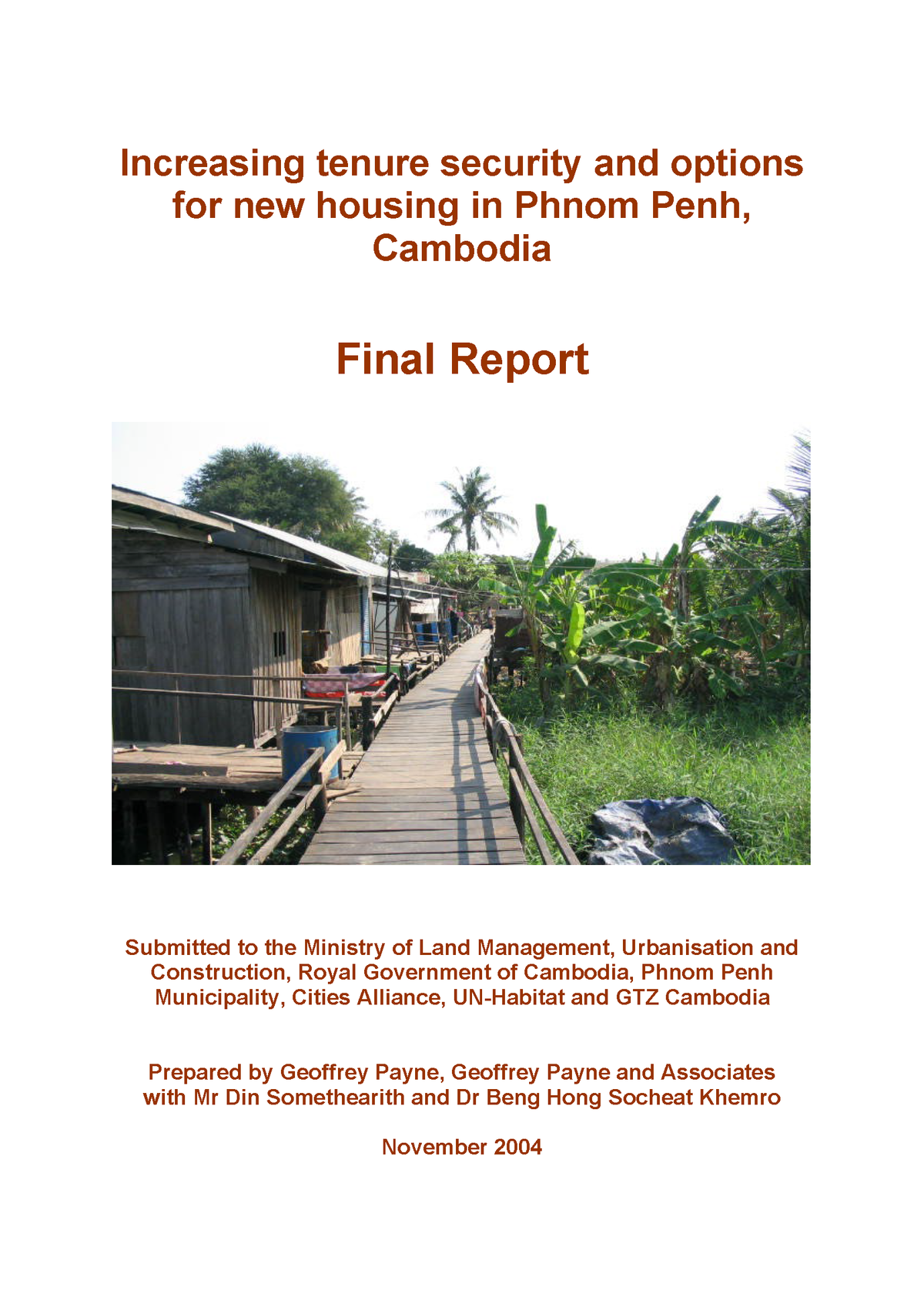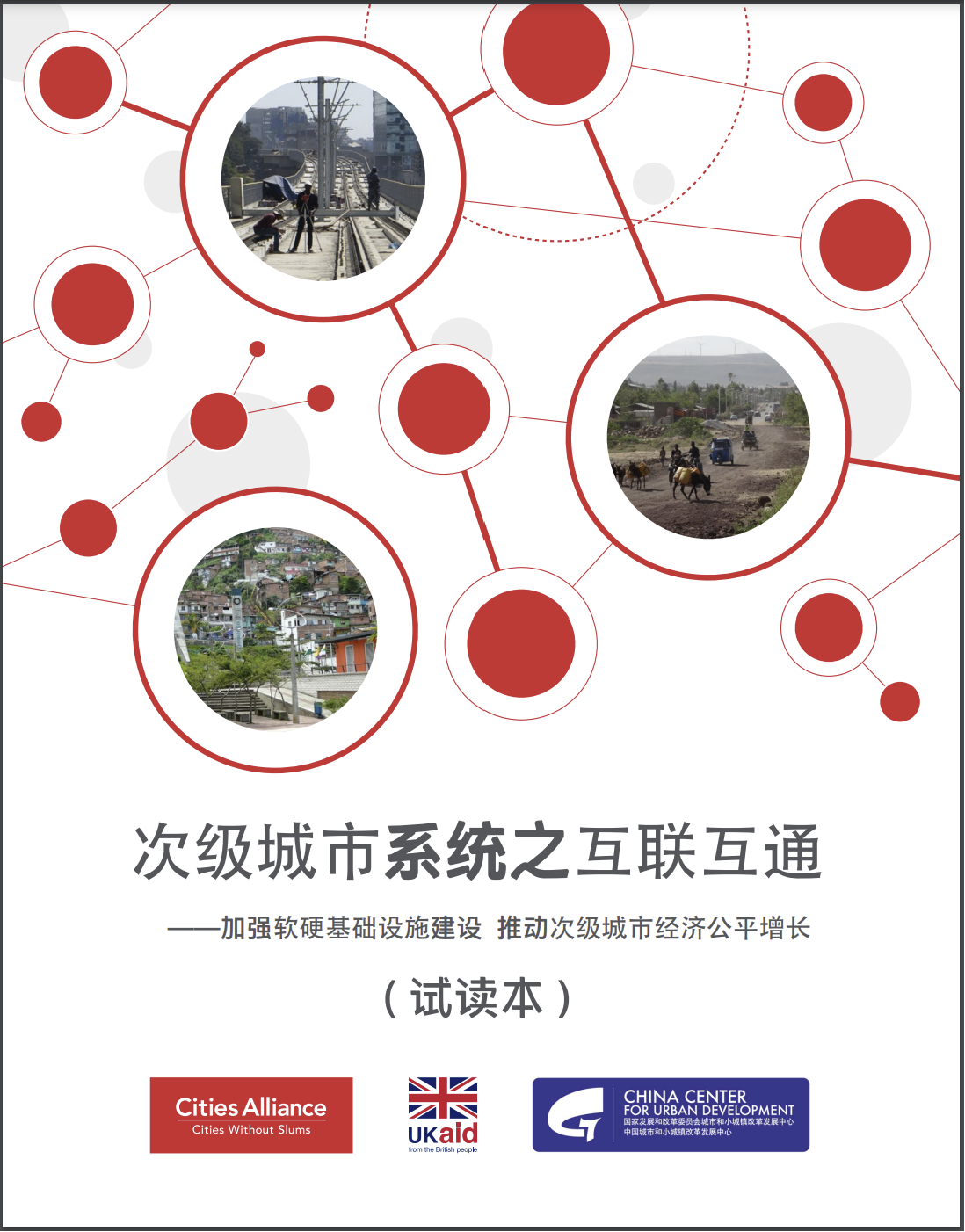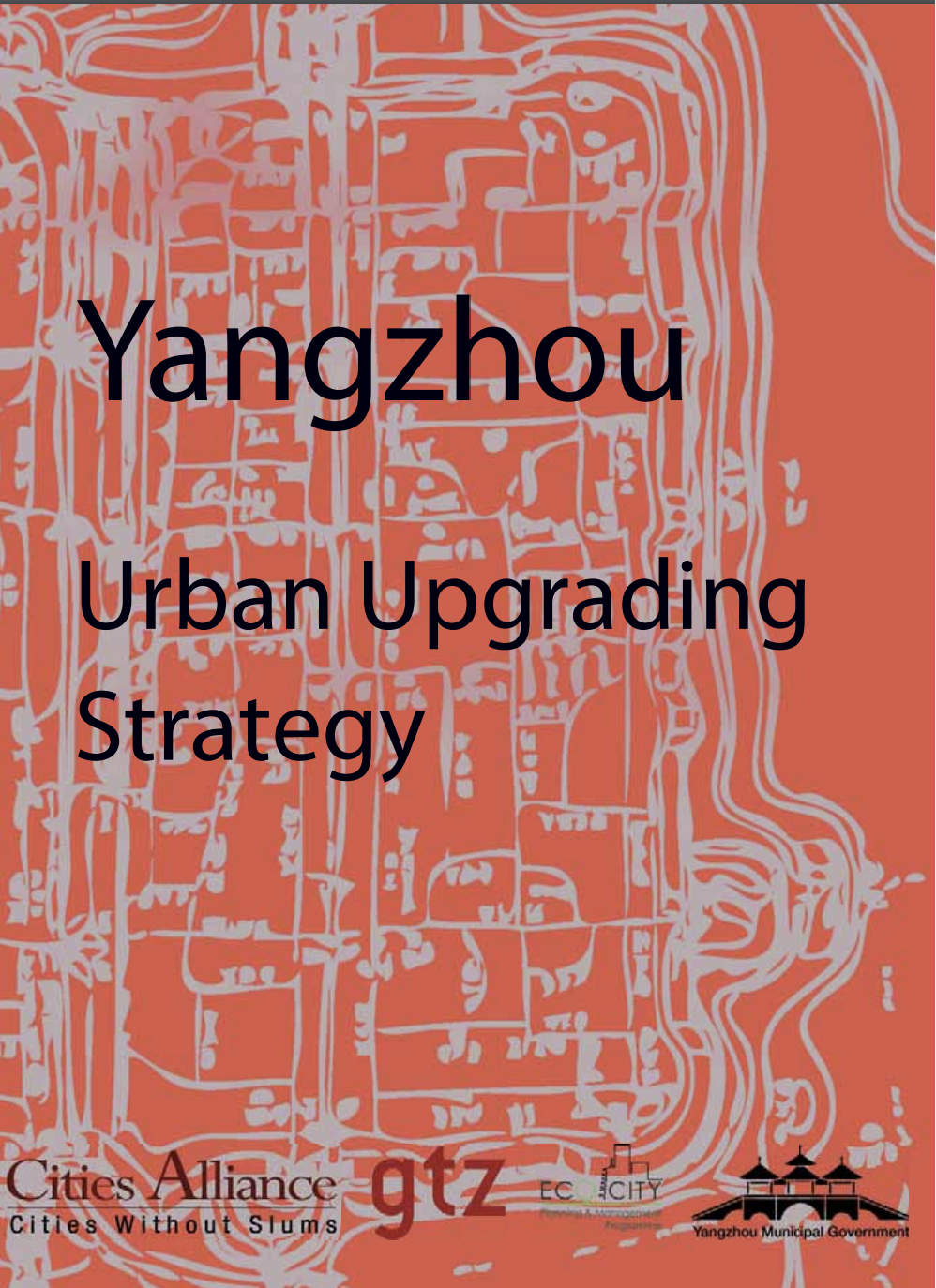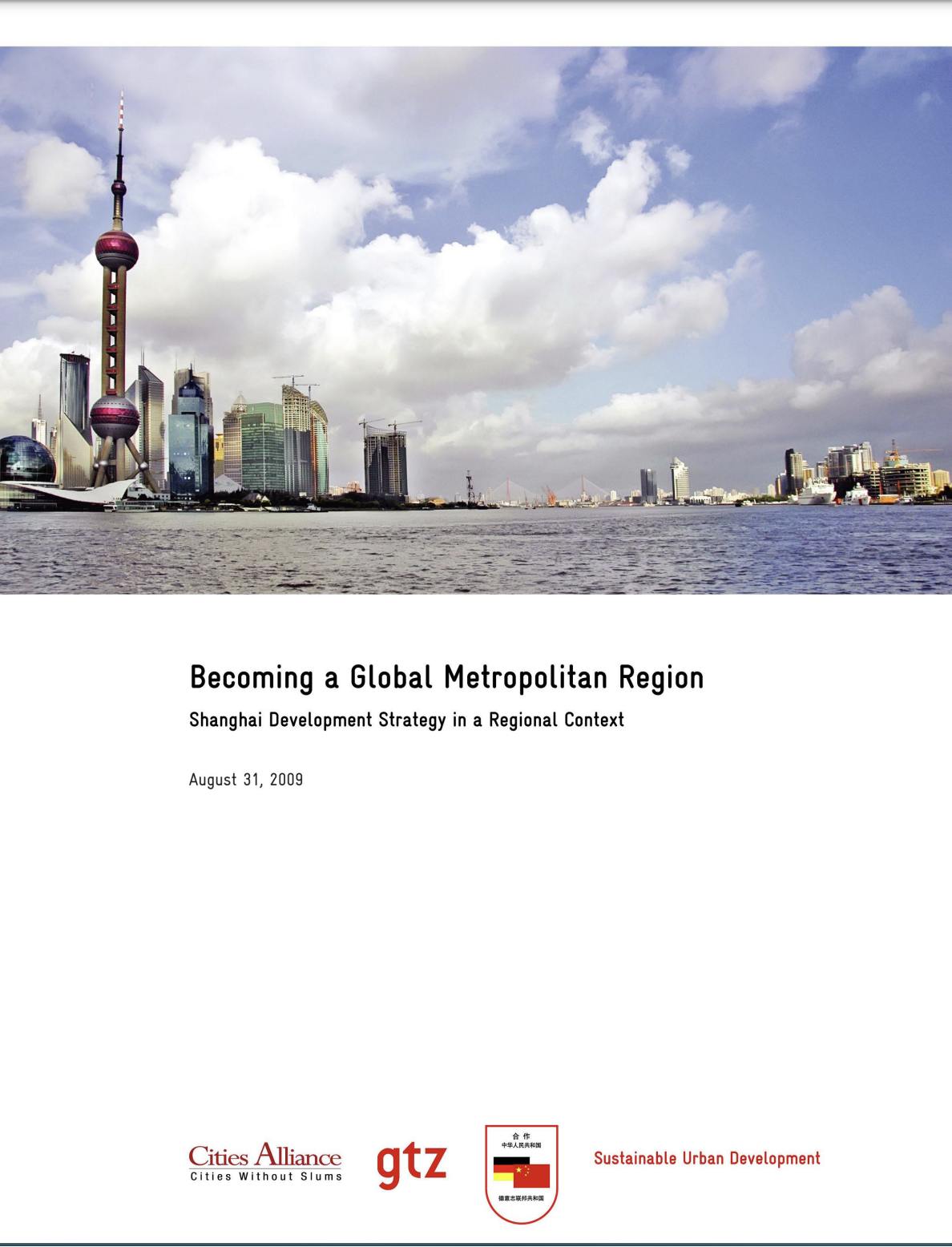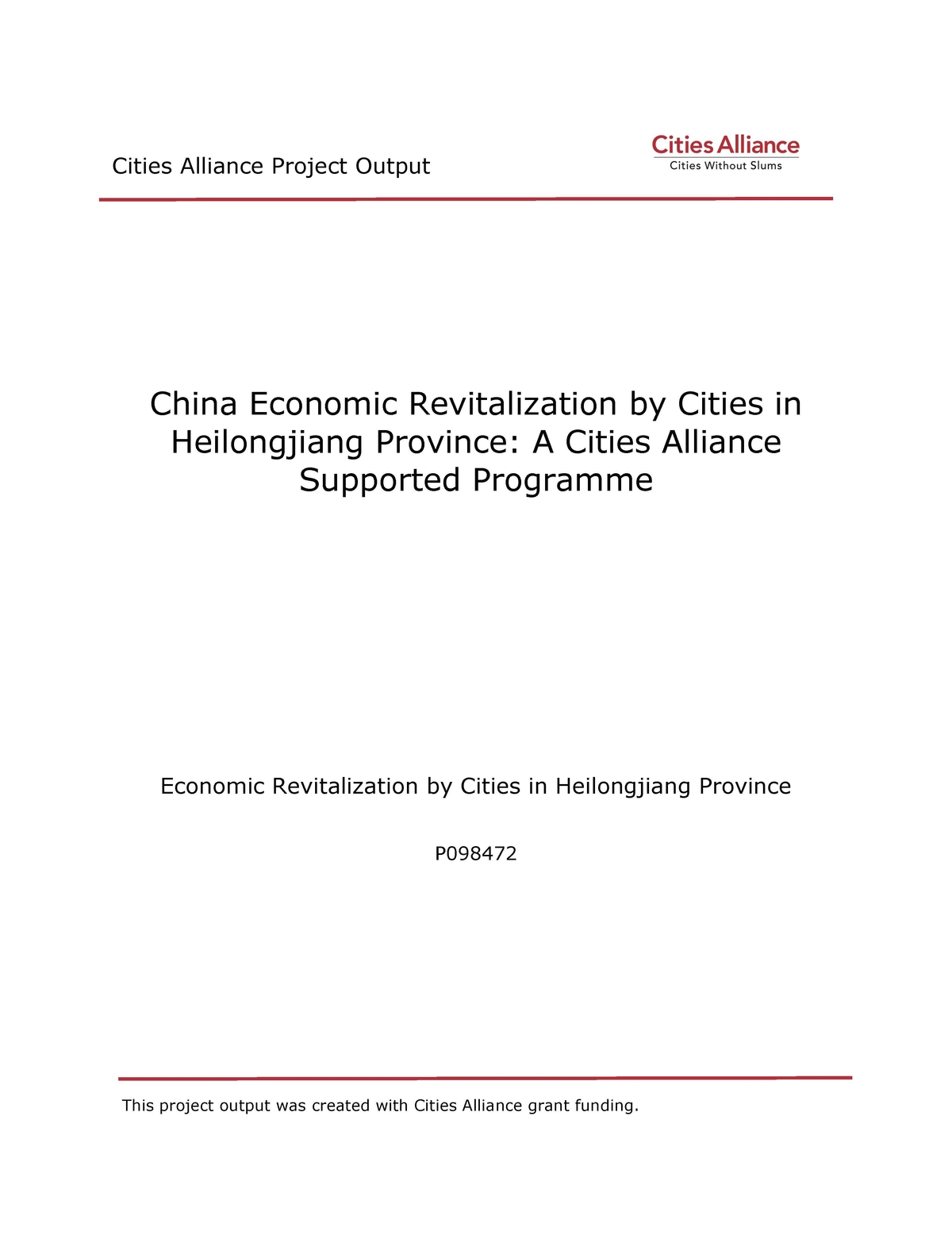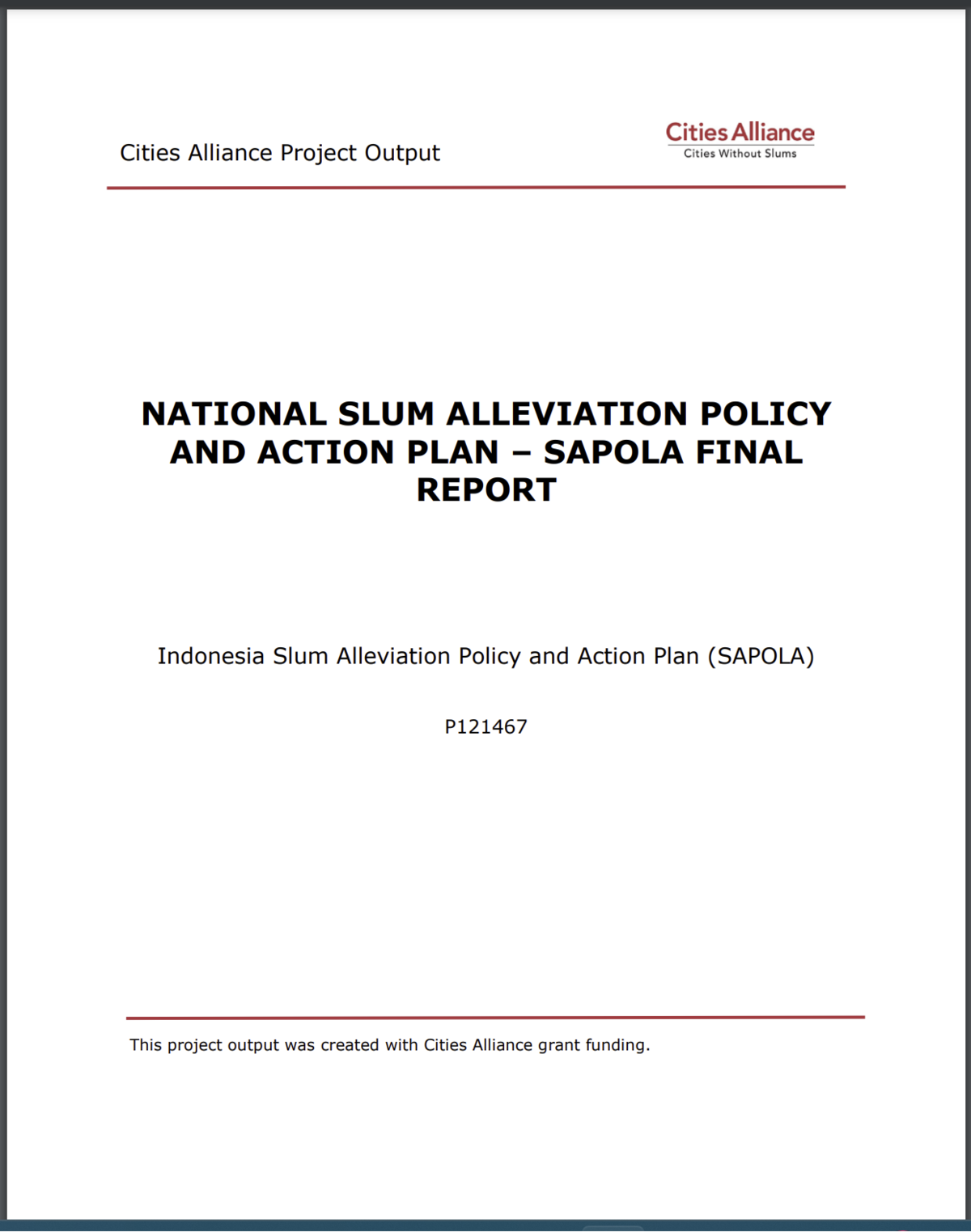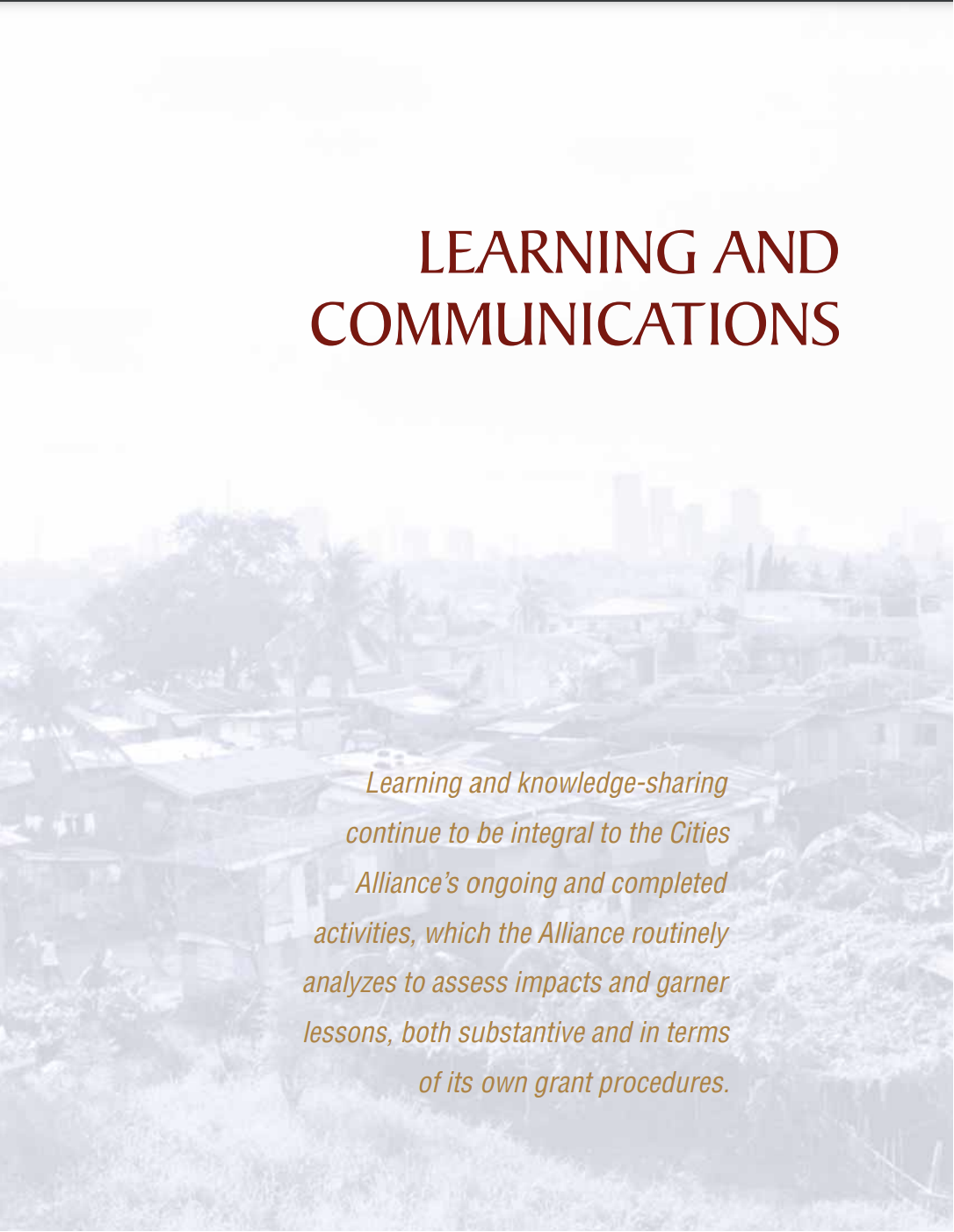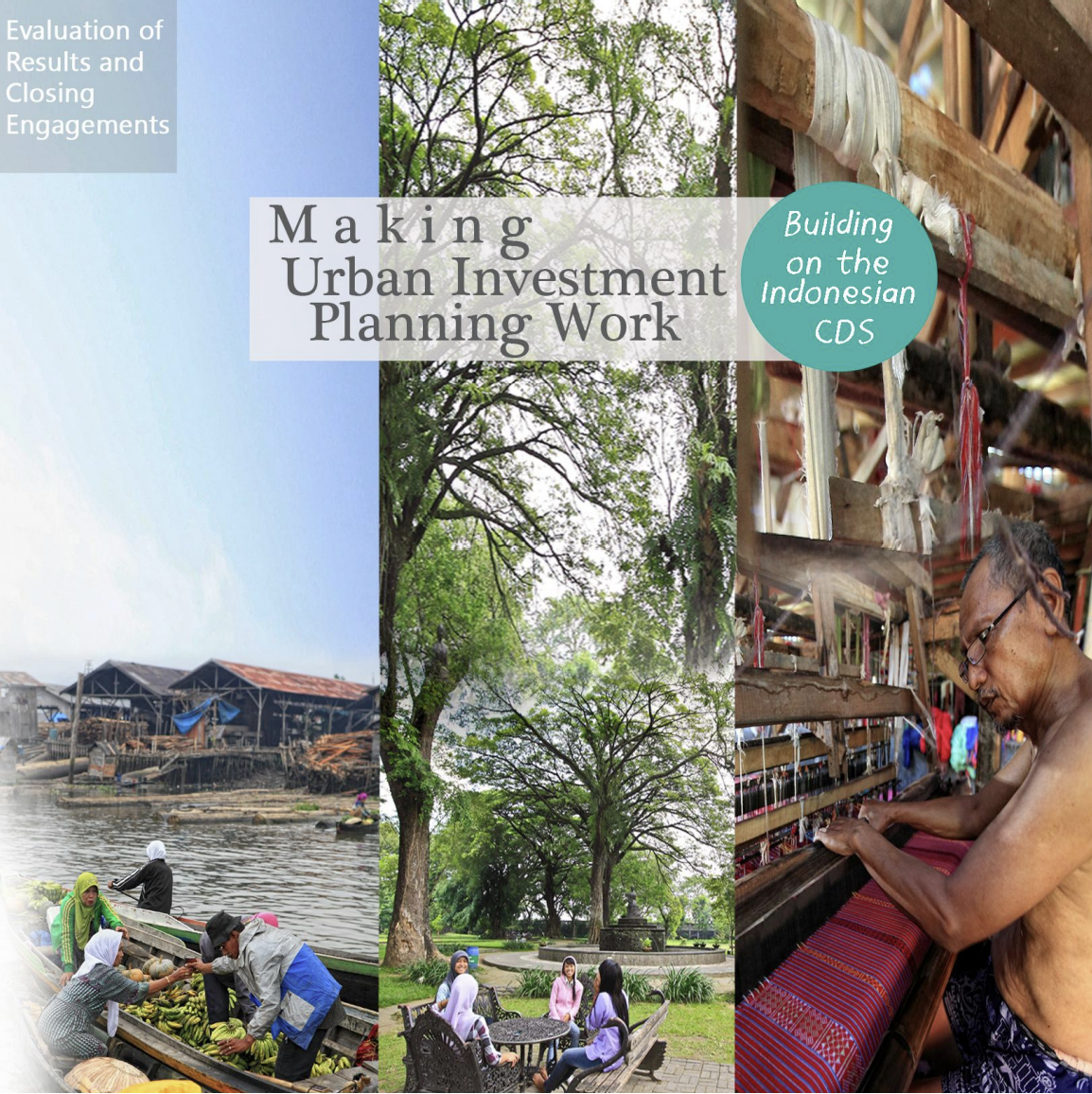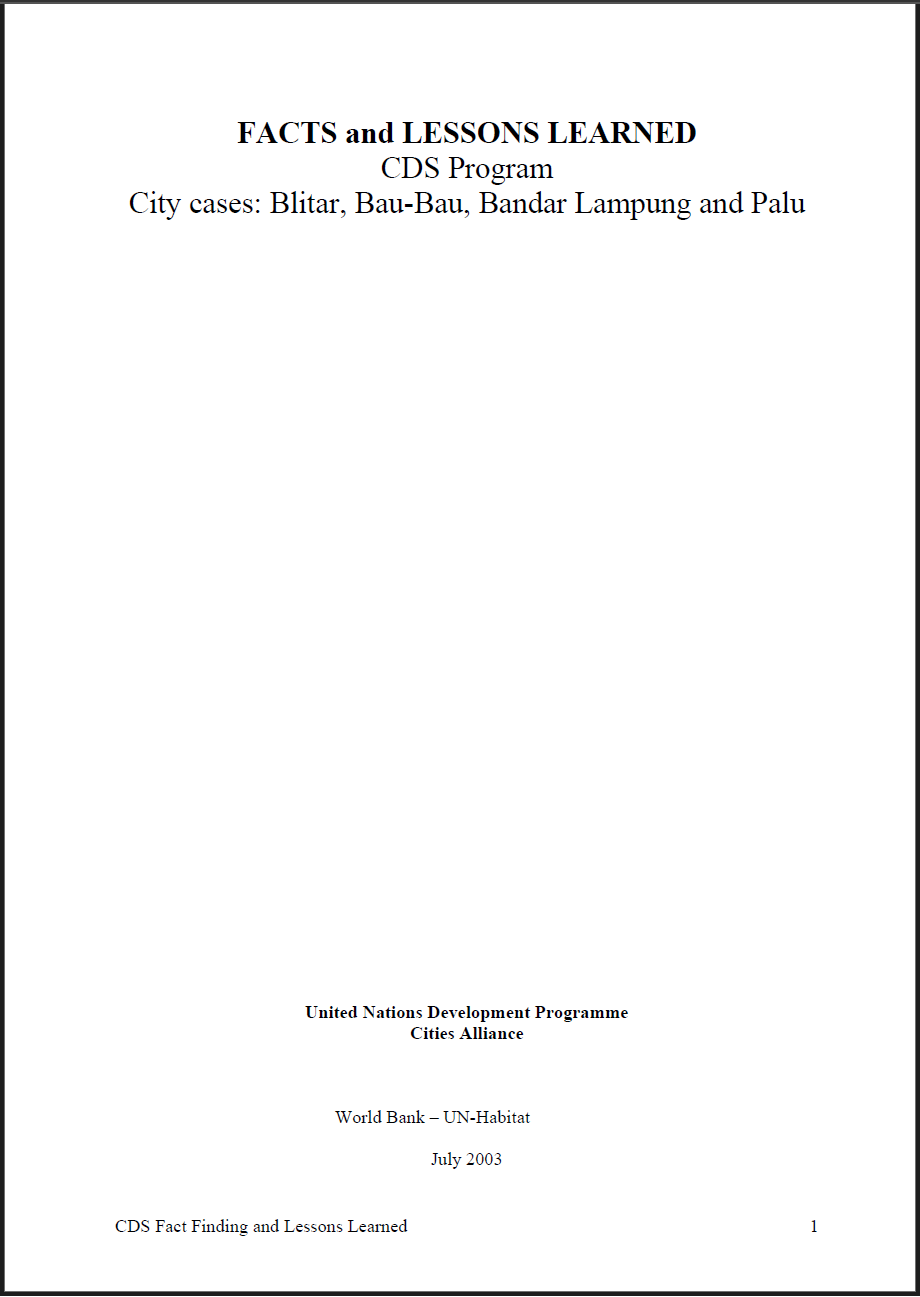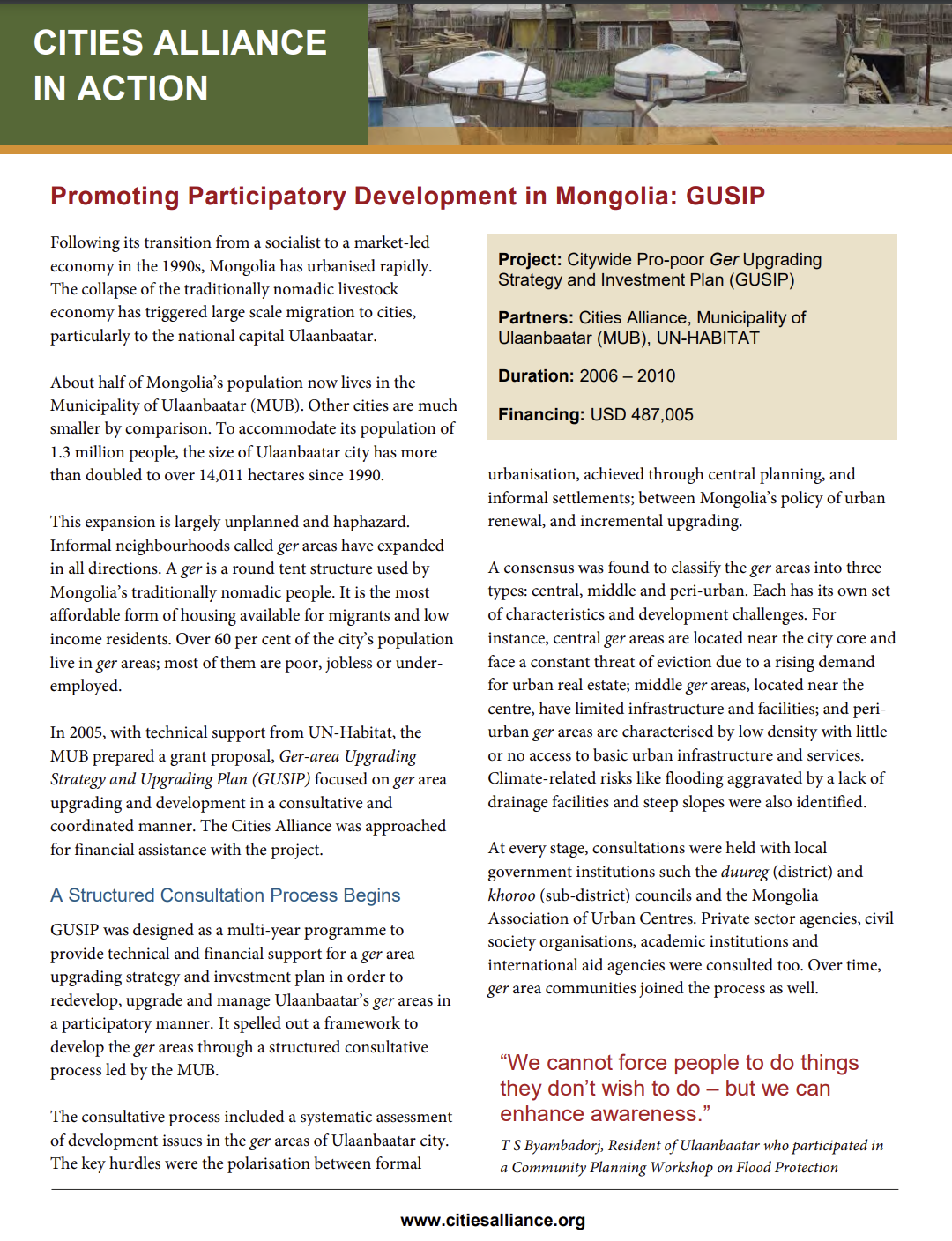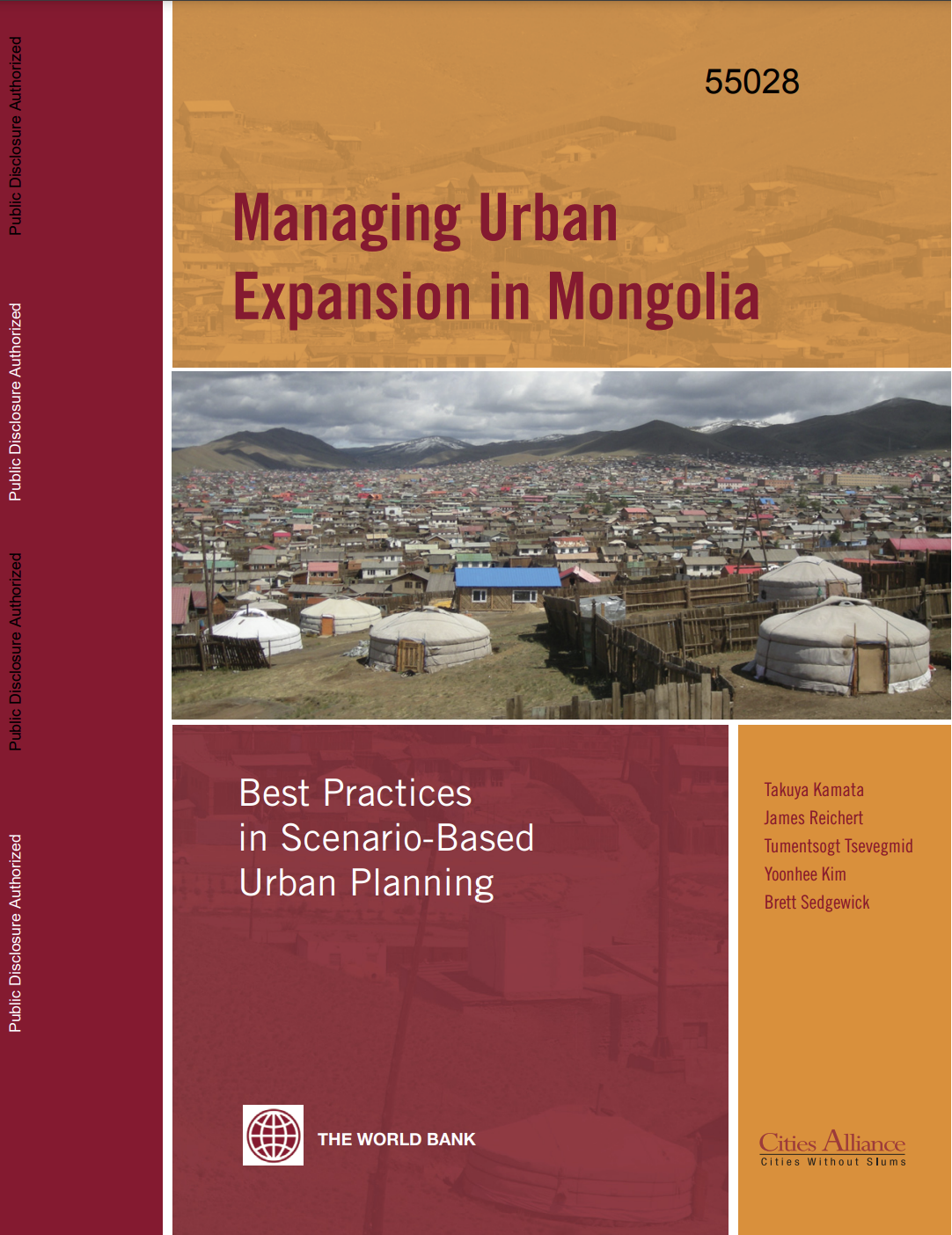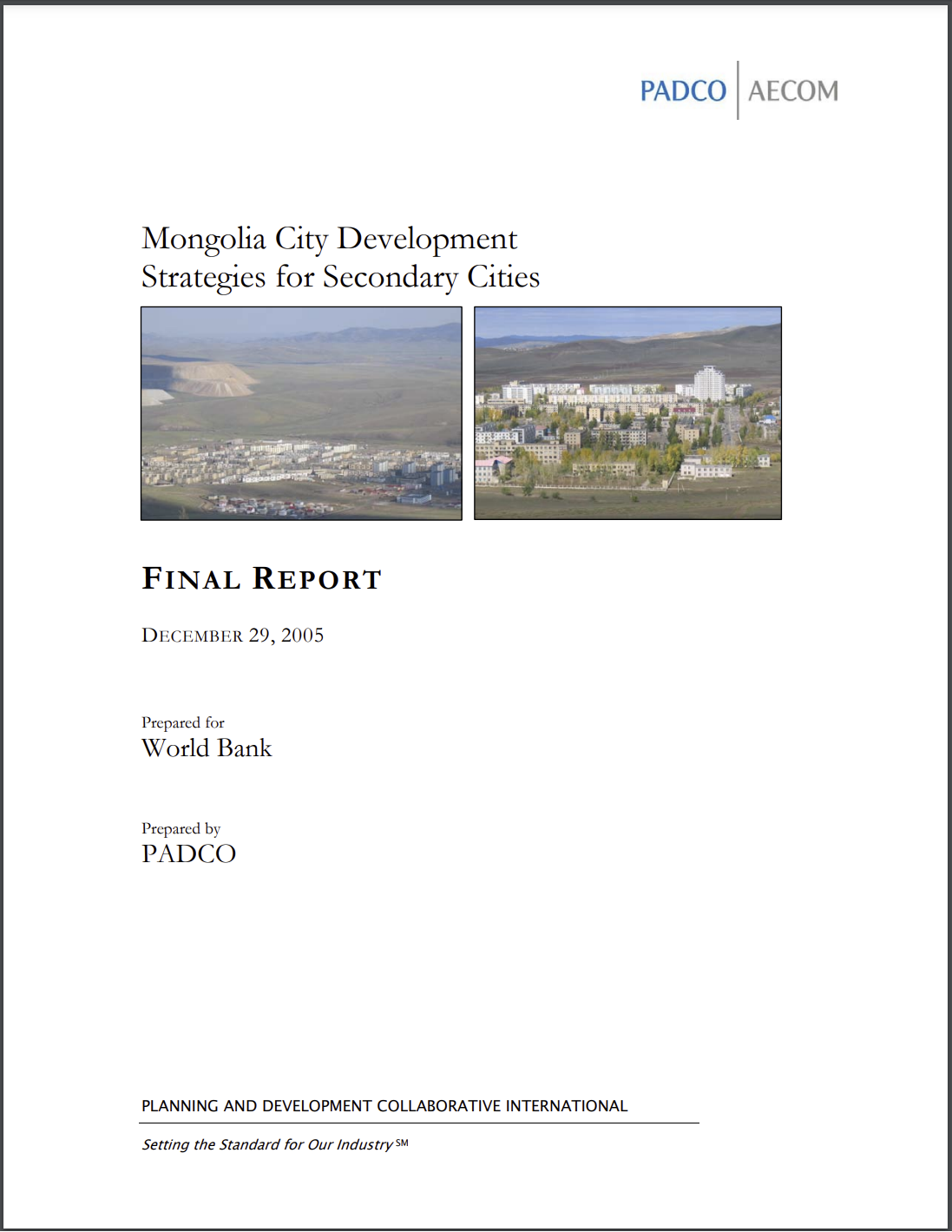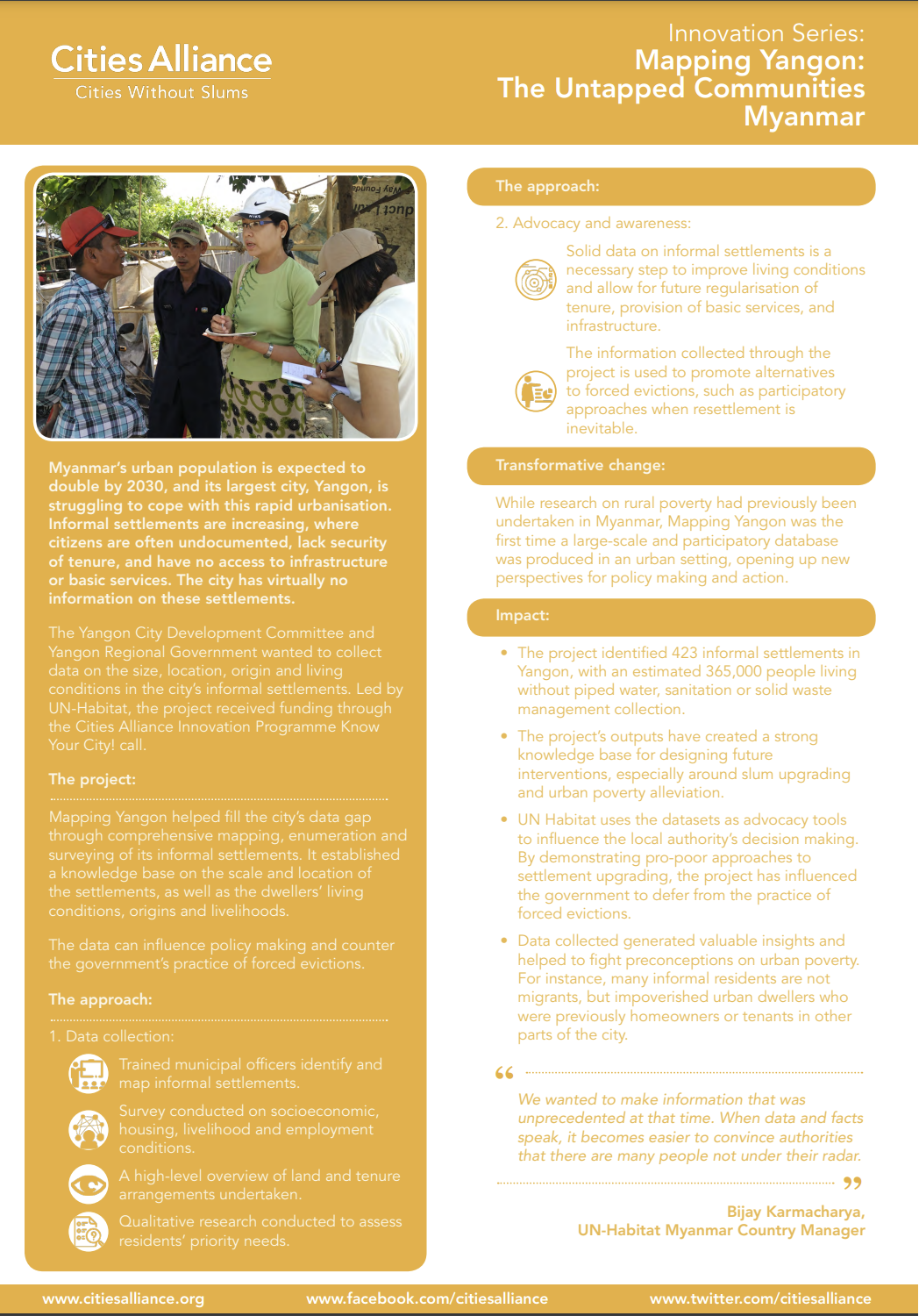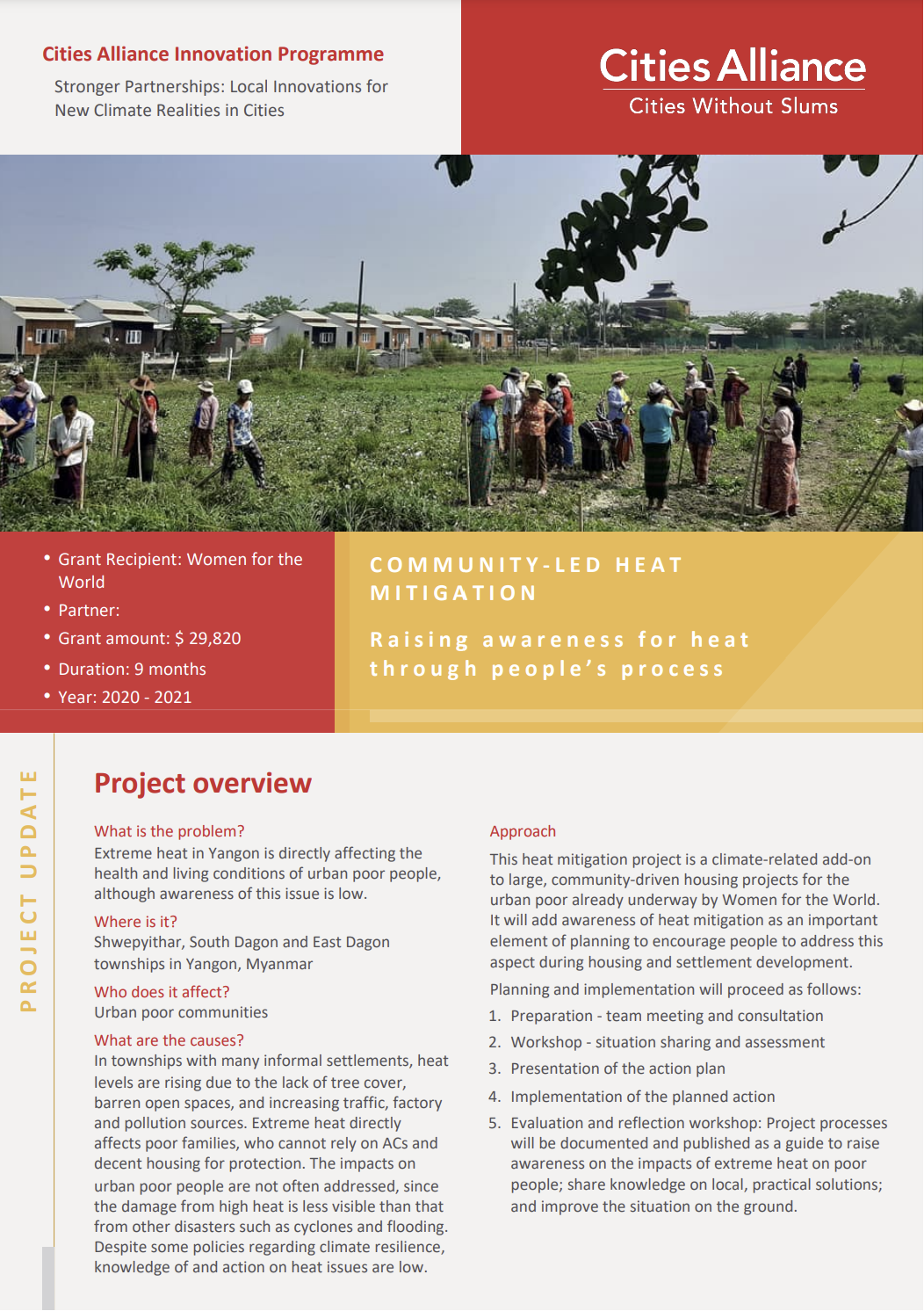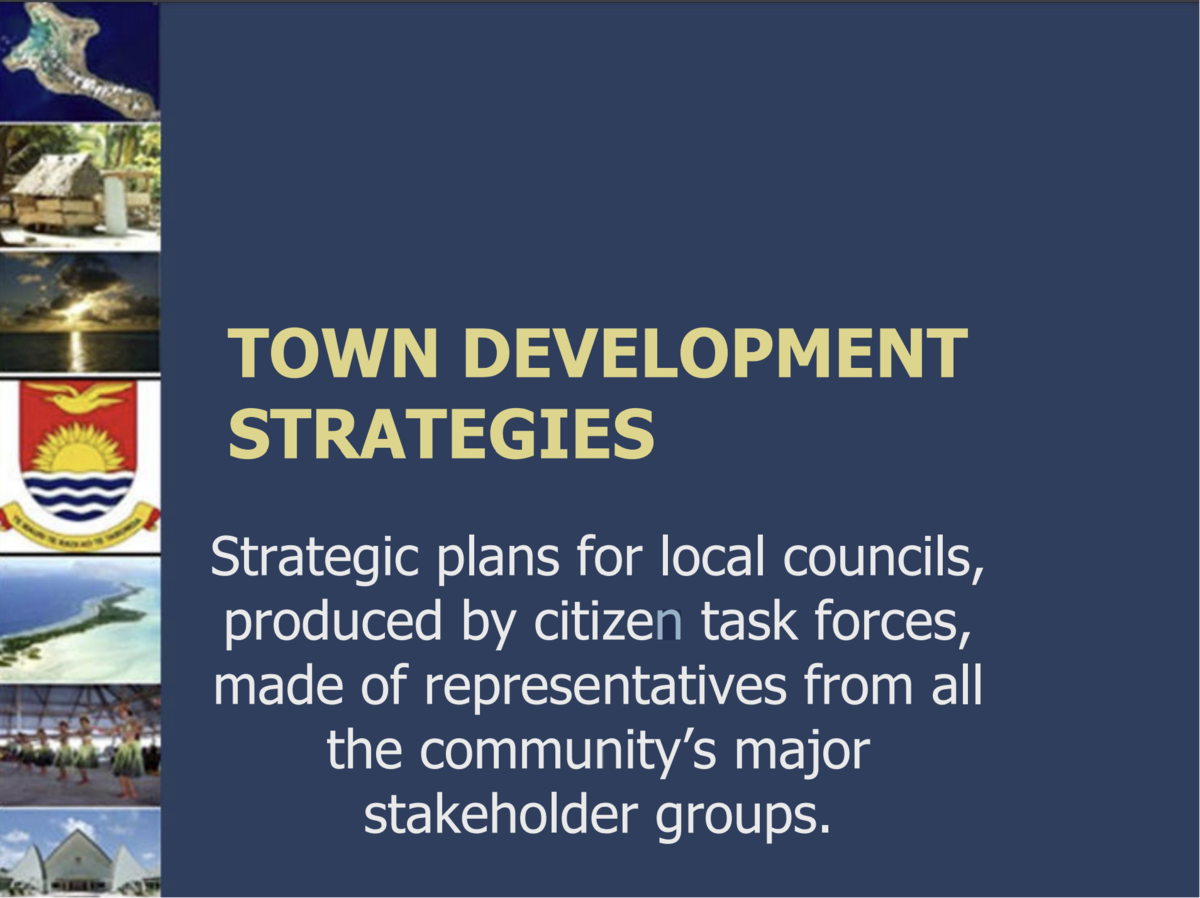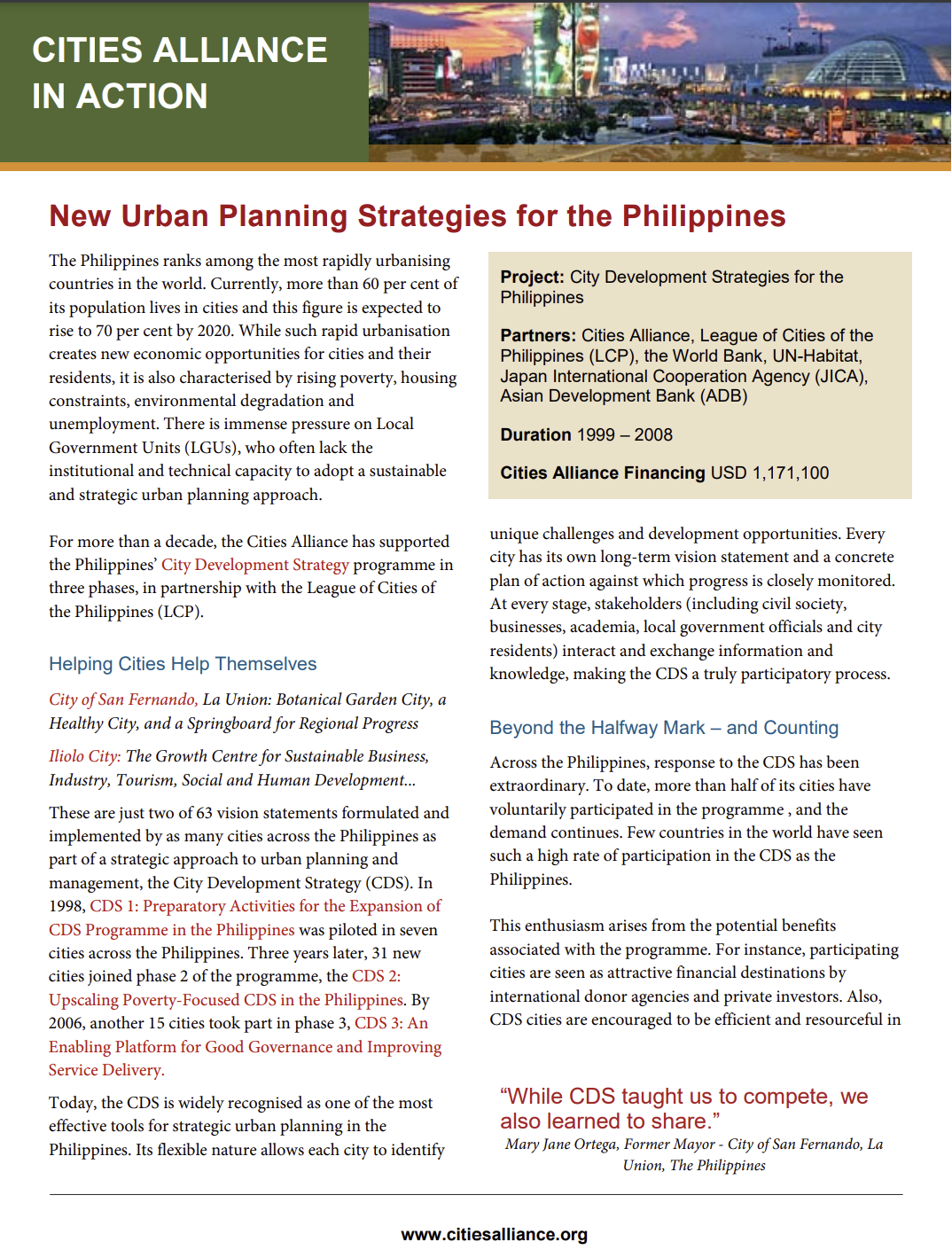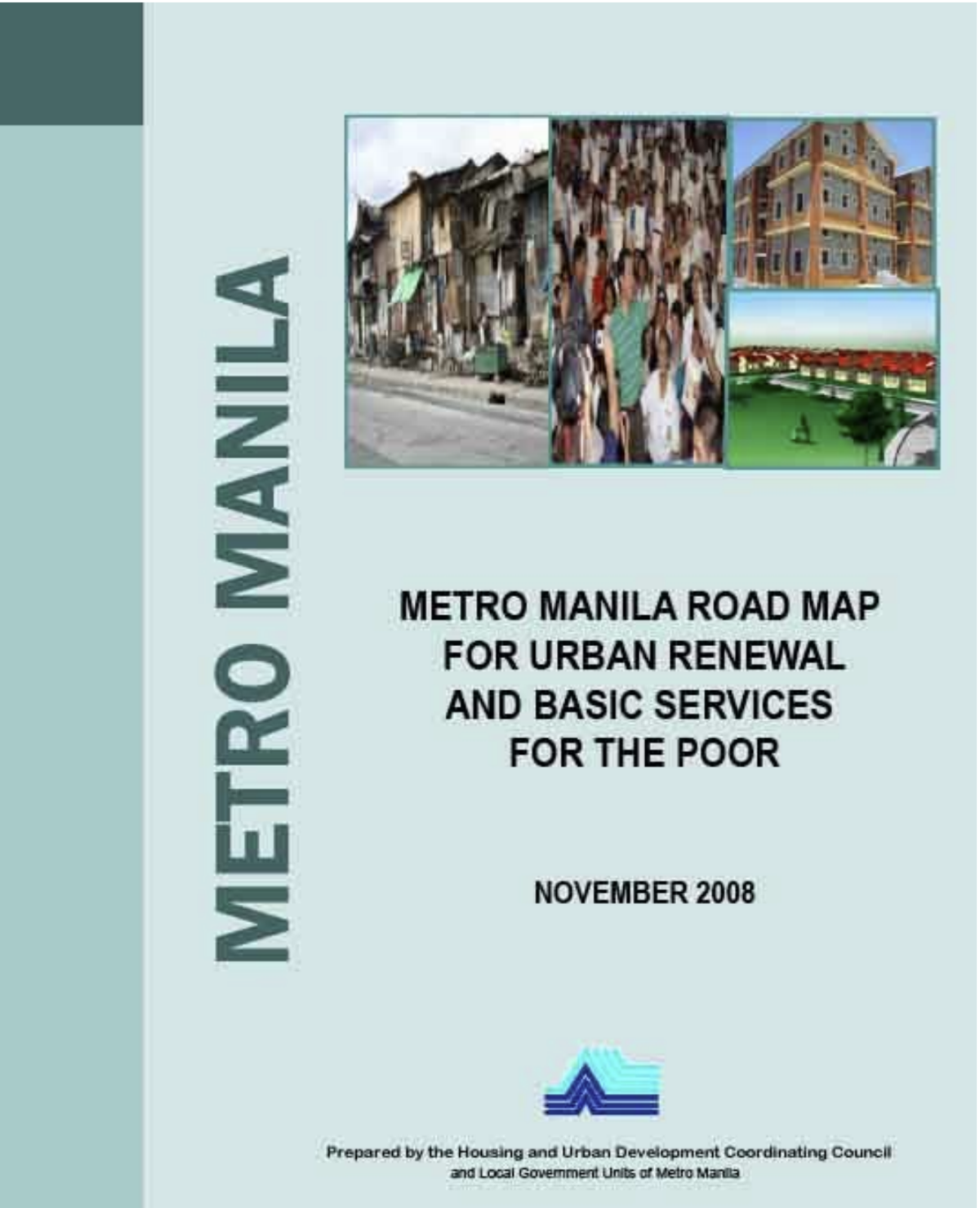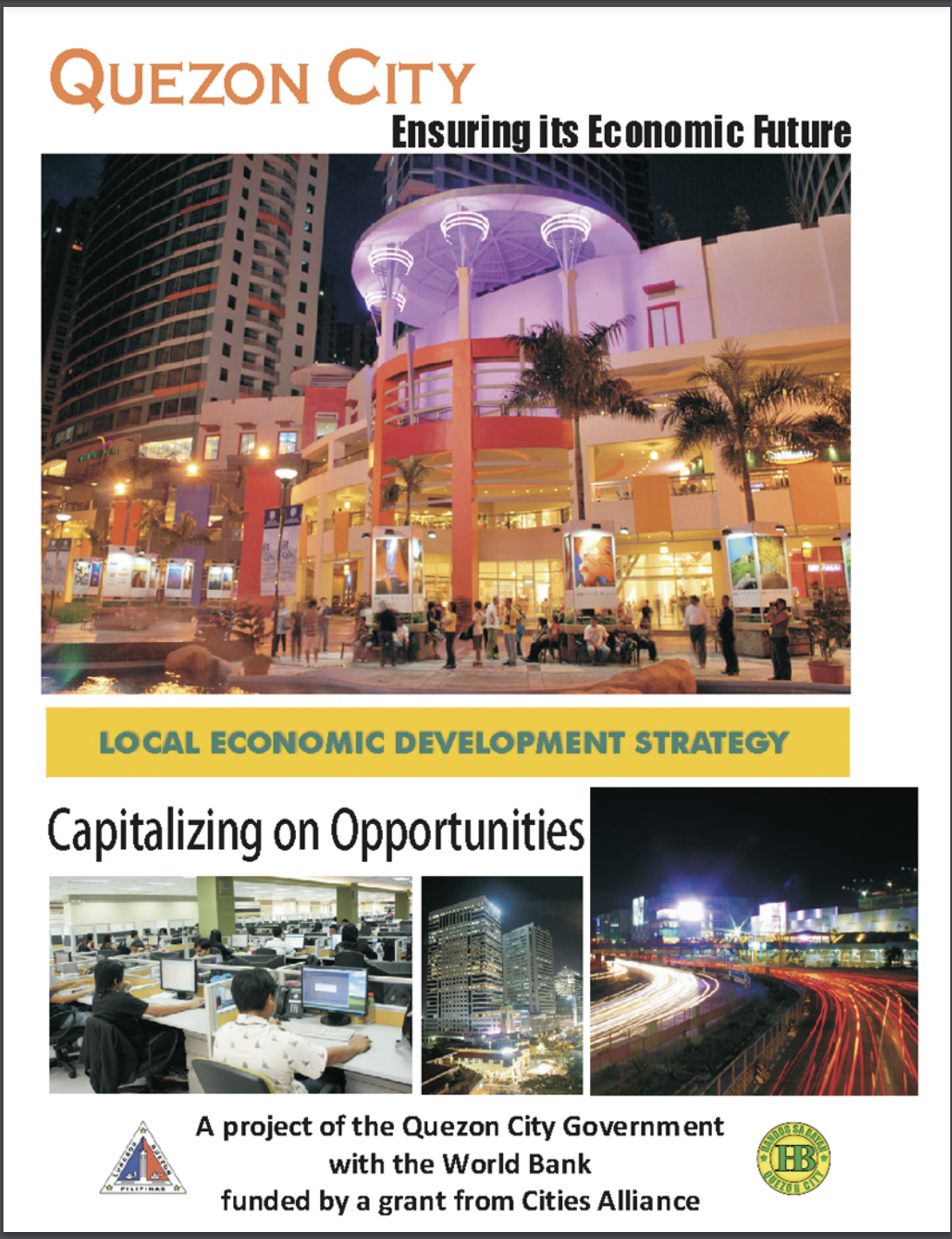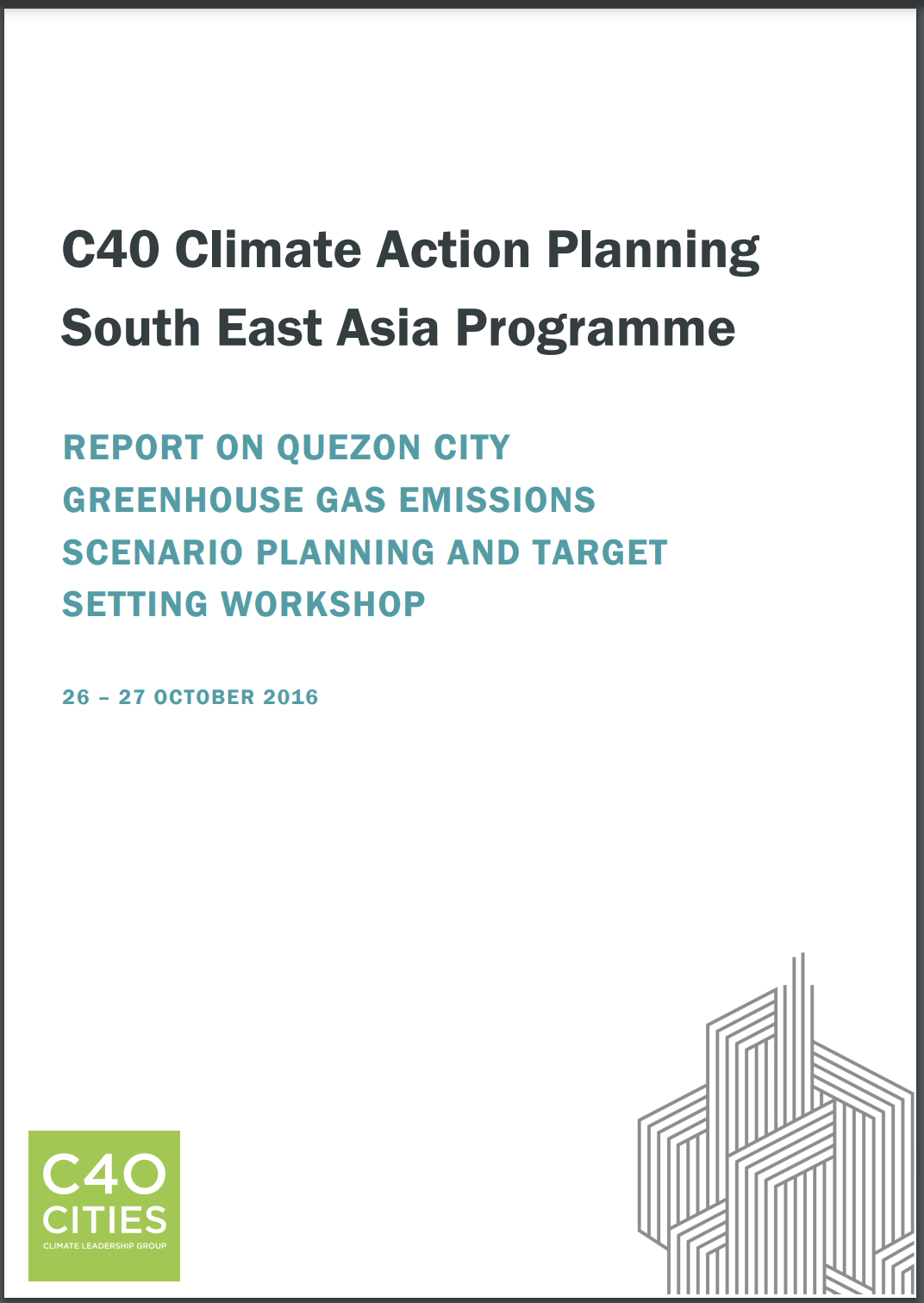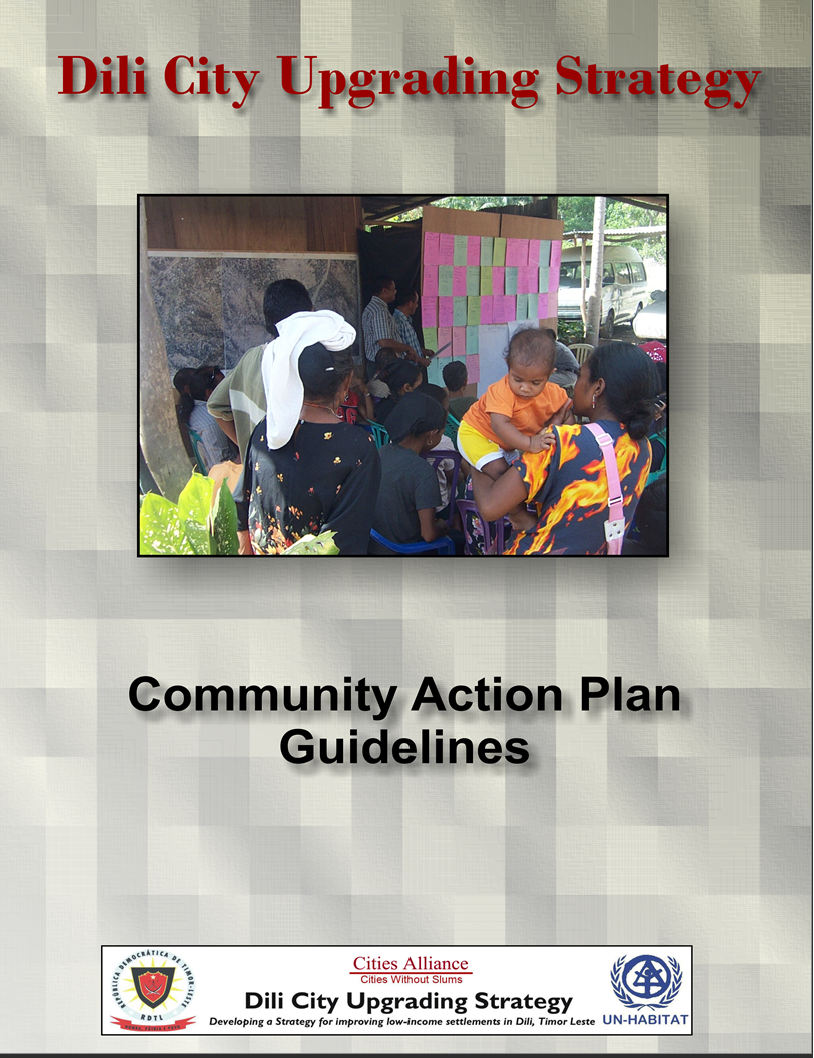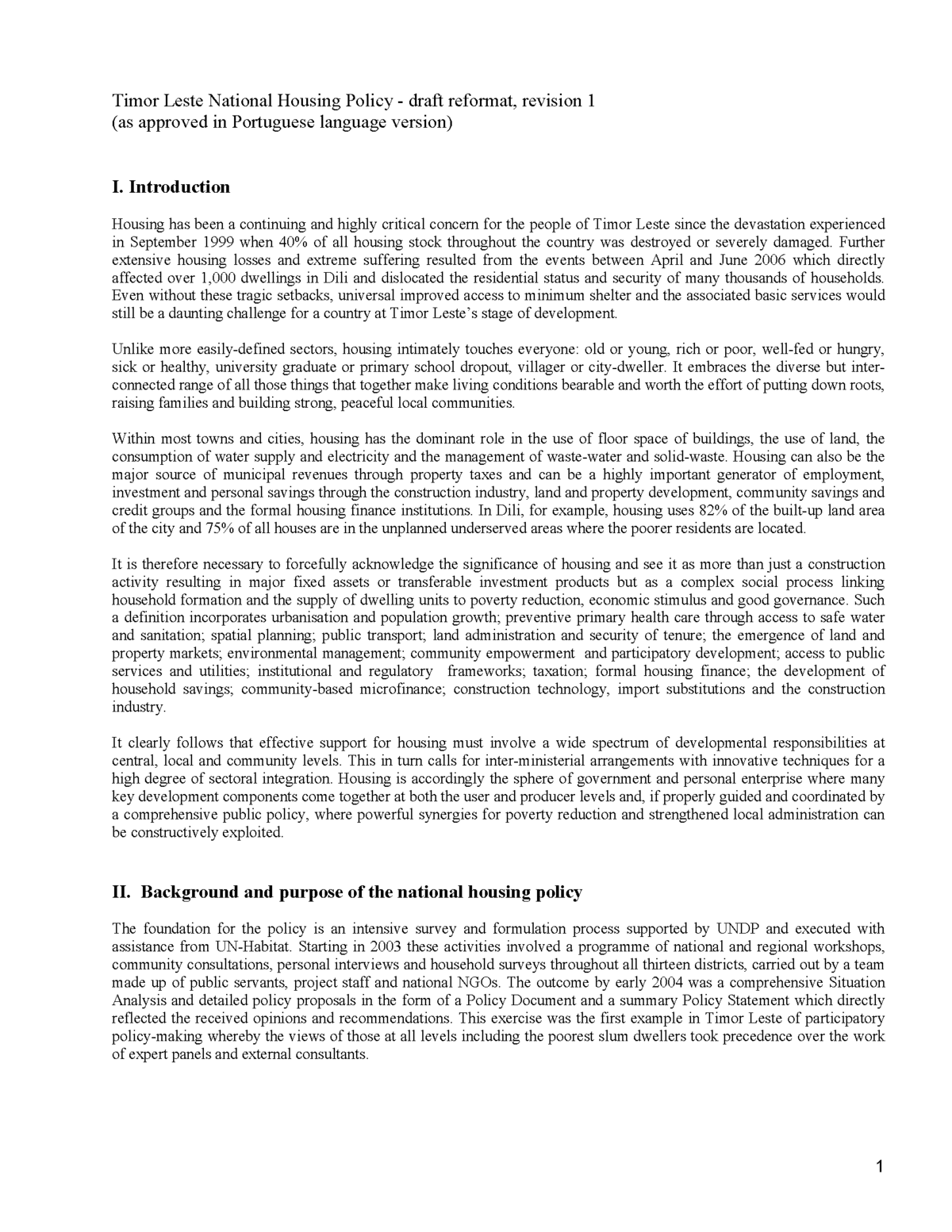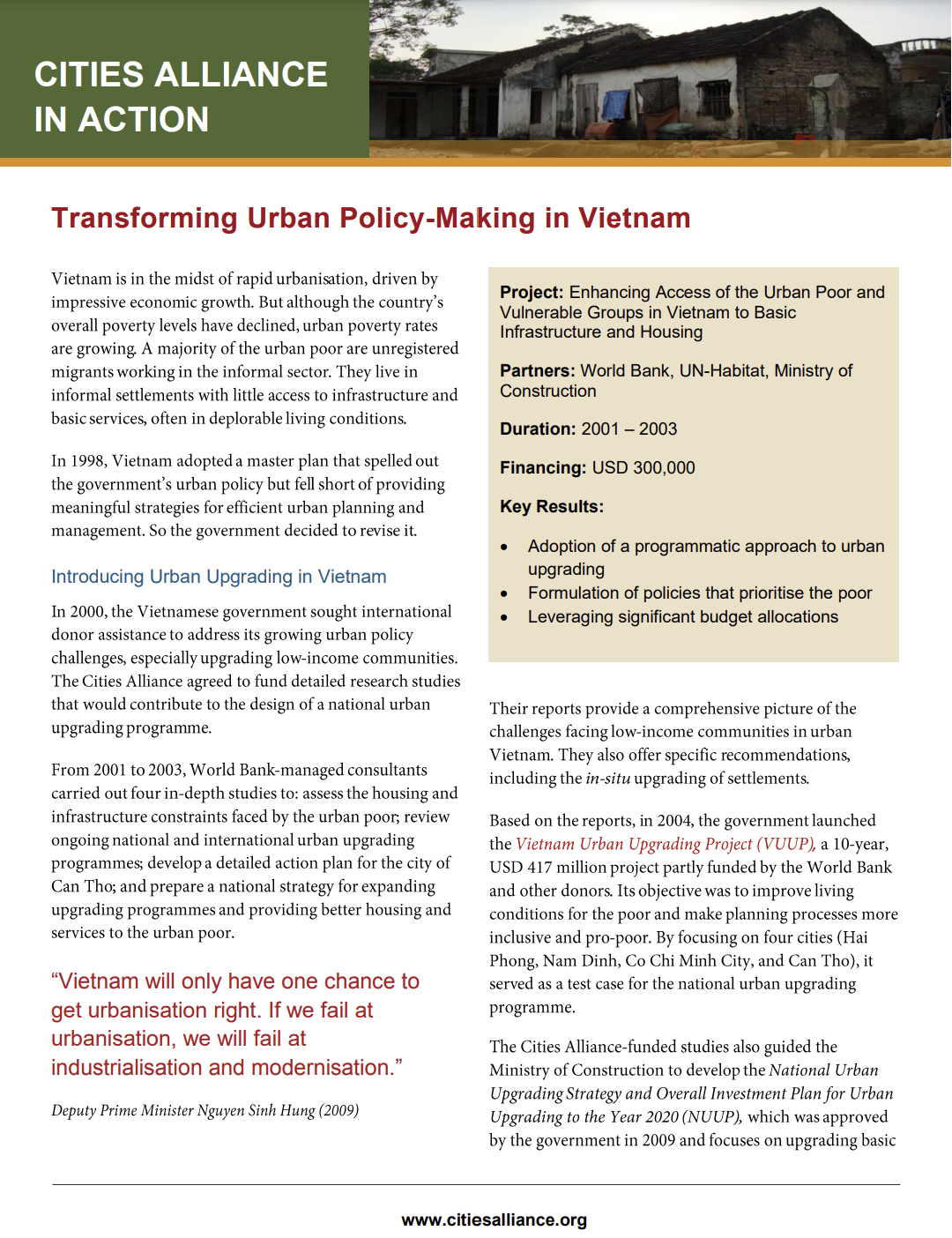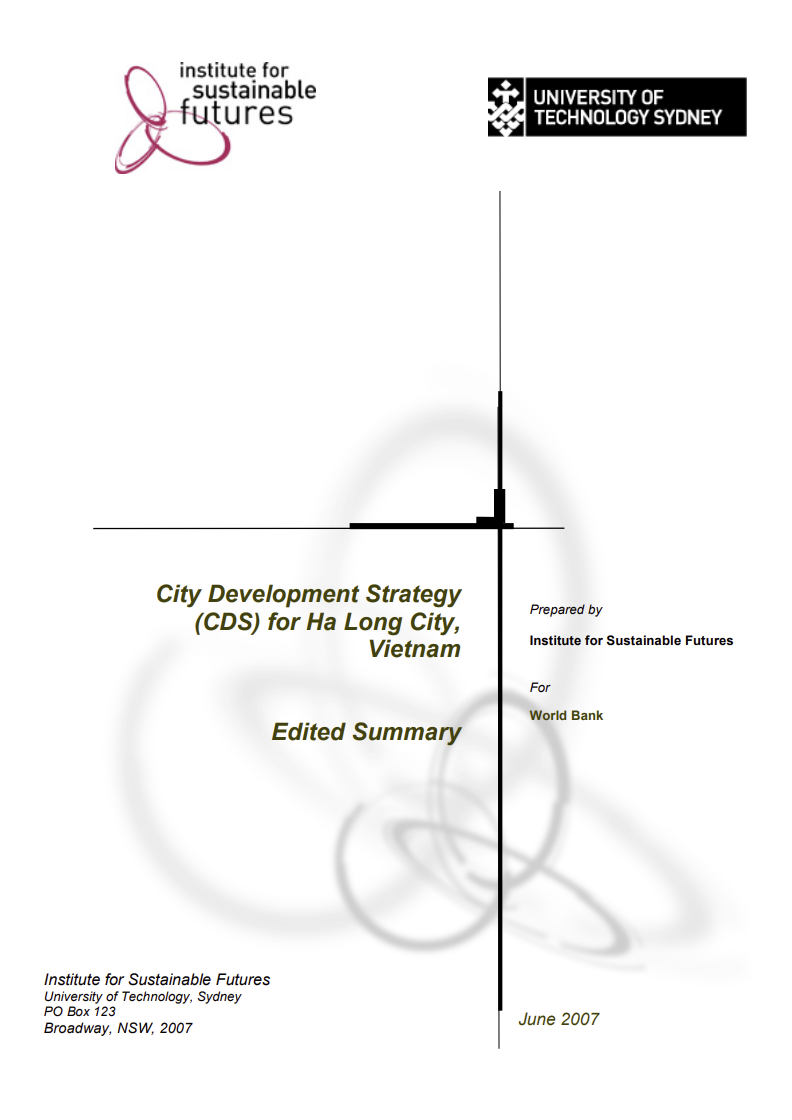Cities Alliance has worked in the East Asia and the Pacific region since 2000, supporting a range of initiatives aimed at catalysing urban transformation and reducing urban poverty.
These activities include a nationwide city development strategy in the Philippines, a series of strategic urban planning initiatives in China, slum upgrading programmes in Mongolia and Indonesia, and a multi-activity Country Programme with national slum upgrading in Vietnam.
They have provided a network of partnerships and experience that Cities Alliance has built on to expand in the region. Launched in 2024 with funding from the Swiss Agency for Development and Cooperation, the regional Urban Mekong Corridor Initiative works closely with partners to foster inclusive green growth among cities in the lower basin of the Mekong River.
Cities Alliance has provided grant funding and technical support for projects in Cambodia, China, Fiji, Indonesia, Kiribati, Laos, Mongolia, Myanmar, Papua New Guinea, the Philippines, Samoa, Timor-Leste, and Vietnam.
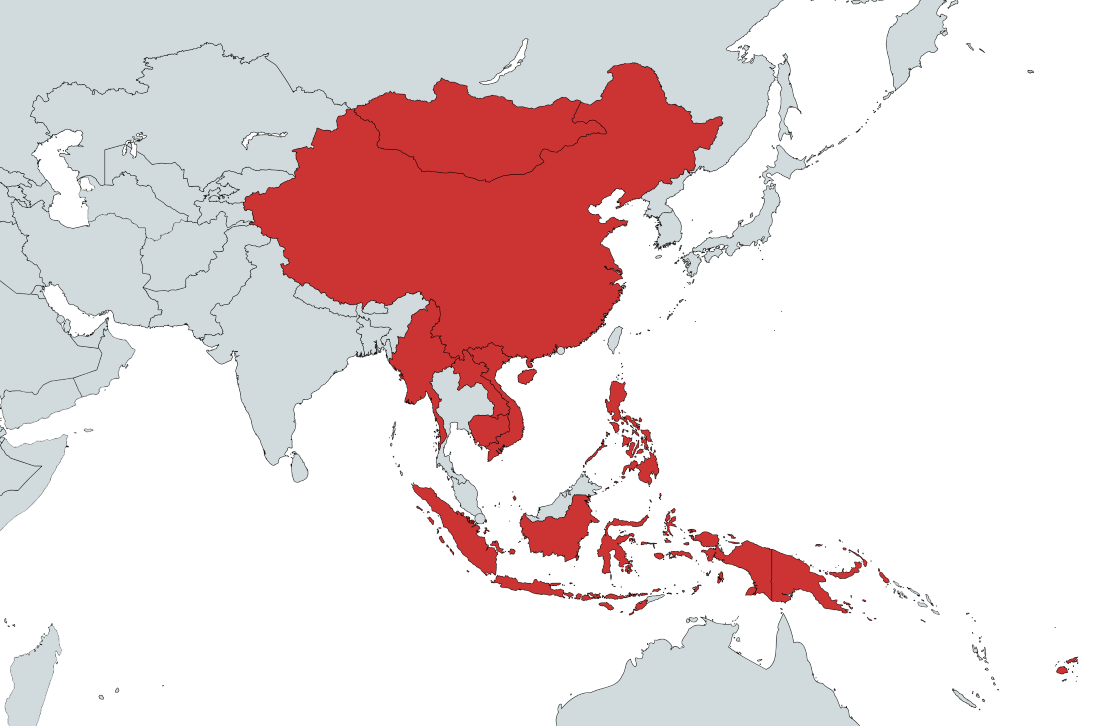
The Urban Mekong Corridor Initiative
This initiative leverages critical urban, regional, and financial partnerships to foster collaborative approaches and develop dynamic economic clusters among select towns and cities in the Greater Mekong Subregion.
It pinpoints and enhances development catalysts to cultivate a more competitive, interconnected, and sustainable network of towns and cities. This effort will ensure inclusive economic opportunities and public services for the urban poor and rural-to-urban migrants. It will also implement green growth strategies to establish livable cities for all residents.
The initial phase of the initiative focuses on countries of the Lower Mekong Basin: Cambodia, Laos, Thailand, and Vietnam. It is part of the Global Resilient Systems of Secondary Cities and Migration Dynamics initiative supported by the Swiss Agency for Development and Cooperation (SDC) from 2018–2026 through the Cities Alliance Cities and Migration programme.
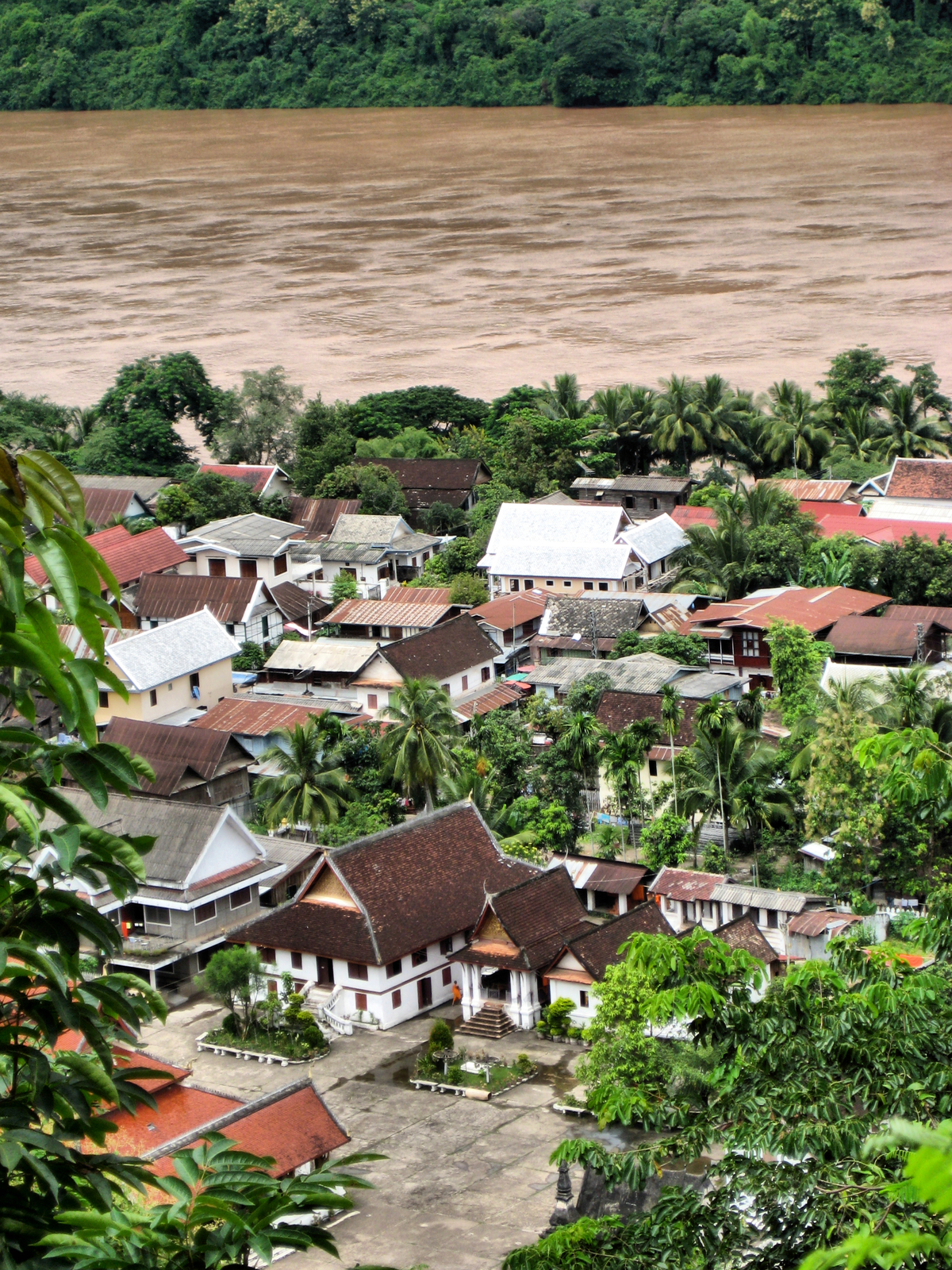
Cambodia
Implemented by UN-Habitat, this project supported development of a people-centred, bottom-up participatory process that enabled the municipality of Phnom Penh to formulate a city development strategy that was a breakthrough for the urban poor settlements in Phnom Penh. The CDS catalysed a major policy shift in upgrading, from ad-hoc projects to a planned, in-situ approach for both the government of Cambodia and Phnom Penh.
A follow-up to the Phnom Penh CDS activity, this project presented the Cambodian government with pragmatic, implementable alternatives to relocating residents of unauthorised slum settlements. It helped strengthen secure tenure as a key component of the government’s national housing policy. It also contributed to an environment conducive to alternatives to eviction, including the establishment of a Housing Rights Task Force to monitor evictions.
China
In 2019, Cities Alliance supported a study and subsequent publication by Prof. Brian H. Roberts on Connecting Systems of Secondary Cities as part of the DFID-funded Joint Work Programme on Equitable Economic Growth.
The study examined ways secondary cities can work more collaboratively to improve their development prospects, lift prosperity, and leverage public resources to support equitable and sustainable sub-national economic growth and development.
It also outlined ways governments and other stakeholders within systems of secondary cities can invest strategically in public goods and services, improve connectivity, develop networks, and leverage common user facilities, infrastructure, and resources at different geographic levels to support inclusive, equitable, and sustainable development.
Given the significant relevance of the topic to the current development of Chinese cities, Cities Alliance translated the book into Chinese in 2020 in collaboration with the China Centre for Urban Development.
This project had three major objectives:
1) Contribute to a more sustained approach to city planning that includes management and maintenance issues, and the improvement of standards and techniques for augmenting the living conditions in vast areas of the existing city that are predominantly inhabited by low-income families;
2) Strengthen residents’ ability to improve their living and housing situation; and
3) Identify appropriate financial sources and develop adequate financial mechanisms that allow sustainable urban upgrading, including the government, residents and private sector.
In collaboration with Shanghai Development Research Centre, this project supported the development of a CDS for Shanghai through: (1) Refining the vision and strategies of the SMG in a regional context, based on its 11th FYP;
(2) Identifying measures and interventions to improve the municipality’s structure of economic and social development longer term; and
(3) Defining monitoring indicators to track progress.
This CDS influenced Shanghai’s 12th Five-Year Plan (2011-2015) by providing policy recommendations based on sound international experience that become value-added inputs to the implementation of Shanghai and neighbouring provinces’ 12th Five-Year Plan and their related Long-Term Development Plans.
This project assisted cities in Heilongjiang Province (Harbin, Mudanjiang, Jixi, Daqing and Qiqihar) to enhance their effectiveness, equity, and financial sustainability through a CDS process that focused on:
- Local economic development and industrial restructuring;
- Unemployment/urban poverty alleviation; and
- Urban environmental improvements, applying an eco-systems and circular economy approach.
The project extended the pilot CDS exercise in Fuling (1999) to a broader metropolitan level: One major city-region of three cities (Changsha, Zhuzhou and Xiangtan) and one other provincial capital (, Guiyang) involving participatory formulation of regional development strategies.
It devoted particular attention to strengthening the linkage between economic development policy and physical and infrastructure planning, and the financial viability of investment plans.
The project led to the establishment of an indicators system as part of a monitoring and evaluation system in cities that participated in the Cities Alliance-sponsored CDS activities.
This tool allowed for a realignment of investment programmes and management practices to ensure the achievement of set objectives and provide ways of measuring the impact of economic strategies and municipal core functions upon the quality of life of those at the lower end of the income brackets.
The programme built upon the World Bank’s successful assistance to the Chinese government in developing a national urbanisation agenda at the central level and the smooth implementation of CDS activities in four major cities in Hunan and Guizhou Provinces.
It assisted four major Chinese city-regions (Chengdu, Baotou, Lanzhou and Zhengzhou) to upgrade the effectiveness and equity of their development strategies, particularly through an enhanced incorporation of poverty concerns, regional developmental and management linkages, and stakeholder consultation.
The programme addressed economic and infrastructure development strategies for the cities and improvements in the labour market and social service, as well as regional linkages and coordination of such strategies.
Indonesia
The Cities Alliance co-financed an initiative by the government of Indonesia to develop a national slum upgrading policy and action plan that addressed the needs of the poor living in urban slums.
The policy and strategy defined the role of the national government so that it could enable local governments to promote the upgrading of existing slum settlements and put in place policies and programmes to adequately house growing urban populations.
The initiative addressed three main areas: Land tenure, access to housing finance, and housing stock.
It had four deliverables:
1. A study that assessed the scale of underserved informal settlements in urban Indonesia, census data about slums in Indonesia, and policy options to address land regularisation in the context of encroachment on public and private land, inadequate housing, and the need for improved infrastructure, including investment in municipal trunk infrastructure. The report helped reconcile divergent definitions of slums in the Indonesian context and helped define measurable slum settlement indicators.
2. A GIS Map of Slums in Jakarta that incorporated the use of satellite imagery and a parallel social survey on the ground through trained enumerators.
3. A study on the socio-economic externalities of slums in Indonesia.
4. Formal inter-ministerial consultations at the national and local level in six cities: Medan, Palembang, Jakarta, Surabaya, Makassar and Balikpapan.
The policy and action plan were included in the government’s Mid-Term National Plan 2010-2014.
This project supported the development of a CDS for the region around Yogyakarta. It was initiated in 2003 following the success of the first CDS, which had focused on nine cities.
The objective was to coordinate the planning and development of the five jurisdictions within Yogyakarta, a small province adjacent to the province of Central Java.
The CDS aimed to:
- Develop instruments for identifying visions for sustainable economic growth, balanced economic development, and poverty reduction;
- Disseminate the practical experiences of, and lessons learned, on how to place urban development in a regional context for the benefit of other provinces and municipalities, both in Indonesia and globally;
- Propose programmes for institutional development and investment to promote regional development and poverty reduction and prepare cross-regional financing plans (this third component was closely linked to a prospective World Bank credit).
The project made a demonstrable contribution to the province’s efforts to reduce poverty by:
- Advancing poverty mapping and the institutionalisation of a participatory planning methodology;
- Defining a regional investment programme;
- Initiating pro-poor investments in trading facilities and slum upgrading projects; and
- Developing lending facilities within a local bank for micro- and small businesses.
The initiative established cooperation between the Directorate General for Human Settlements (DGHS) and three cities in Indonesia that already practiced good governance and invested in better urban environments: Banjarmasin, Pekalongan and Surakarta.
The cooperation encouraged the three "good practice" cities to drive further the development and dissemination of effective city investment planning within the framework of Indonesia's medium-term investment programming.
The three cities developed and showcased pro-poor, participatory citywide development and financing strategies. The DGHS underscored their efforts by channeling investment funding to the cities on a priority basis.
The DGHS and the cities documented and disseminated proven and validated good urban management and investment practices to new cities, making use of the medium-term investment programming's facilitator network, the Urban Sector Development Reform Programme (USDRP) city network, and city-to-city networking directly undertaken by the three cities in collaboration with a national local government authority.
This initiative supported nine cities in Indonesia to prepare poverty-centred city development strategies as one of the primary tools for prioritization of urban investments.
The activities included developing city profiles, a CDS document, a consolidated report on implementing the strategies, and reports on the participatory works and processes for each of the participating cities. It also created a website for the cities, www.cdsindonesia.org.
Mongolia
This activity supported the development of reviews, guidelines, action plans, and toolkits to help the city of Ulaanbaatar develop a better-coordinated and more clearly defined Ger-area upgrading strategy and investment plan.
The project's objectives were to:
1) Develop a city-wide pro-poor Ger-area Upgrading Strategy in a participatory manner through sharing urban development information, reviewing opportunities and constraints, and reaching a consensus on the future growth direction of Ulaanbaatar
2) Prepare citywide urban development guidelines that summarised institutional linkages between planning and land management functions, proposed reforms, modern sub-division design approaches, land use regulations and servicing standards
3) Prepare Ger Area Improvement Plans for prioritised areas to both test out guidelines as modern urban management tools and provide preliminary infrastructure and service delivery plan as a basis for follow-up investment
4) Design a long-term sustainable financing strategy Ger Area Investment Programme to implement Ger Area Action Plan
5) Develop an institutional strategy to enable the municipality of Ulaanbaatar to adopt new urban planning and management approaches
6) Formulate and implement knowledge-sharing and policy-learning mechanisms for national replication
The structured consultative process adopted under GUSIP was instrumental in participatory development of the City-wide Pro-Poor Ger Area Upgrading Strategy of Ulaanbaatar.
In July 2007, Citizens’ Representative Council of Ulaanbaatar city adopted this strategy for its implementation. Since then, the strategy has been guiding the design and implementation of national and international programmes for upgrading and development of Ger Areas in Ulaanbaatar city.
The activity disseminated analytical work on Urban Expansion in Mongolia. The objectives were to:
1. Provide clear cost and benefit information to residents and policymakers so that they have a better understanding of the consequences of the planning practices
2. Identify qualified communities for the development of basic infrastructure in the light of preparation for future IDA projects.
It included reports, presentations, and brochures printed both in English and Mongolian and disseminated to the key stakeholders through workshops, meetings, and media. The studies were disseminated to key stakeholders through a series of workshops and other public outreach activities.
The project supported the city development strategy process in five secondary cities in Mongolia (Darkhan, Erdenet, Khovd, Choibalsan, and Tsetserleg.
It produced a report that summarised the participatory planning approach used in each city and the findings of diagnostic studies. It offered detailed profiles and scorecards that covered key economic/infrastructure indicators and strategic initiatives for the future development of each city.
The CDS process introduced a new kind of participatory planning approach in Mongolia and formed the basis for support to the cities from the national government and donors.
The project benefited from close cooperation with the Mongolian Association of Urban Centers (MAUC), which was essential for the replication and scaling-up of CDS activities in Mongolia. The knowledge-sharing and peer-learning activities initiated within the group of the five CDS cities as well as with Ulaan Baatar, the first-round CDS city, were very successful.
Myanmar
Mapping Yangon helped fill the city’s data gap through comprehensive mapping, enumeration, and surveying of its informal settlements.
It established a knowledge base on the scale and location of the settlements, as well as the dwellers’ living conditions, origins, and livelihoods. The data can influence policymaking and counter the government’s practice of forced evictions.
This project is a climate-related add-on to community-driven housing projects for the urban poor already underway in Yangon by Women for the World (WfW), in collaboration with Yangon Regional Government.
It will add to the knowledge base about extreme heat and better enable people to address this critical issue as part of housing and settlement planning and development.
Pacific Islands and Micronesia
This project produced proposals for developing city development strategies and Cities without Slums slum upgrading approaches in two to three cities and towns in the Fiji Islands, Papua New Guinea, and Samoa.
The proposals were prepared in partnership with key stakeholders, including local and central government, local partners such as NGOs, CBOs, local leaders, local government associations, and the private sector.
The initiative also aimed to directly support the implementation of the Pacific Urban Agenda and draft regional action framework by developing, operationalising, and documenting the CDS and City without Slums settlement upgrading approaches in the three countries by including a knowledge management component in each proposal.
The Sustainable Towns Programme, a development and governance programme managed by a partnership between New Zealand and Kiribati, aims to help build the capacity of urban governments to directly address problems caused by overpopulation, scarce resources, an unfocused economic development effort, and lax service delivery.
Cities Alliance funding enabled Kiribati's three elected Urban Councils from Betio, Kiritimati Island, and Teinainano, to better develop and implement projects and programmes identified in strategic development plans produced in 2008 by community leaders in each jurisdiction.
The Cities Alliance activities complemented the Government of Kiribati and New Zealand Aid Programme activities by partially funding detailed planning and design processes for public improvement projects identified as high priority in each community's Town Development Strategy.
The Philippines
For over a decade, the Cities Alliance supported the Philippines’ city development strategy programme in three phases, in partnership with the League of Cities of the Philippines (LCP).
Sixty-three cities across the country formulated and
implemented city development strategies as a strategic approach to urban planning and management.
In 1998, CDS 1: Preparatory Activities for the Expansion of
CDS Programme in the Philippines was piloted in seven
cities across the Philippines.
Three years later, 31 new cities joined Phase 2 of the programme, the CDS 2: Upscaling Poverty-Focused CDS in the Philippines.
By 2006, another 15 cities took part in phase 3, CDS 3: An Enabling Platform for Good Governance and Improving Service Delivery.
Today, the CDS is widely recognised as one of the most effective tools for strategic urban planning in the Philippines.
The Cities Alliance supported a National Slum Upgrading Strategy as part of a Joint Work Programme with the Philippines. The strategy is guiding the efforts of national and local government units in upgrading the slum communities and improving the living conditions of informal settlers in the cities.
Implemented by the Housing and Urban Development Coordinating Council (HUDCC), the project addressed urban issues related to housing, resettlement, infrastructure, social services, and job creation in poor urban communities.
The process of developing the strategy included a comprehensive assessment and database on the conditions, issues, opportunities, and risks confronting slum communities. This assessment formed the basis for interventions related to slum upgrading.
This project produced a road map that focuses on how slums and informal settlements ⎯ profound symbols of urban poverty in Metro Manila ⎯ can be reduced, if not eradicated, over 15 years.
It provides the blueprint for how Metro Manila can respond to the urban development challenges its status as a new megacity brings.
Metro Manila requires a new form of urbanism; a commitment to a holistic approach to urban renewal as well as affirmative actions for how its slum and informal dwellers can reap more benefits from a better quality of urban life.
The road map is based on the Medium-Term Philippine Development Plan 2004-2010, which reflects the government’s resolve to fight poverty and bring prosperity to every Philippine household.
This project provided grant support to the League of Cities of the Philippines (LCP) to develop a knowledge management and exchange system for city managers and stakeholders to strengthen the capacity of cities to effectively manage inclusive urban development.
Activities included:
1. Development of city management learning modules based on local and international experiences of projects and initiatives on city management
2. Development of a web-based knowledge platform to facilitate wider access and encourage participation by city managers and other stakeholders in the learning and knowledge-sharing programmes under the LCP knowledge management system
3. Development of a business plan to scale up and sustain the knowledge management and exchange system upon project completion
The new system strengthened the capacities of city managers and planners to manage their cities. The pilot training assessment report revealed that the cities improved their capacities as seen in their final outputs, which are city plans.
The members of the Homeless Peoples’ Federation Philippines Incorporated (HPFPI), with a population of about 8,000 families, are living in poverty. They experience issues of security of tenure and limited access to basic services.
The COVID-19 pandemic and prolonged lockdown are exacerbating their plight and making it increasingly difficult for the communities to recover due to financial shocks to the households, increasing tensions with land and housing rights, and rapidly rising inflation.
This project is helping fill some of the financial gaps and lack of social aid programmes in the government’s response. It is also increasing dialogue and collaboration between government institutions and local community groups, creating increased integration between them, and bolstering a more community-centered approach to governance.
Activities include building the federation's capacity for gender mainstreaming, disaster risk reduction (DRR) and climate change adaptation (CCA), youth inclusion, and savings management. It also features livelihood support activities to support the urban poor in their efforts to survive the aftershocks of the pandemic.
This two-year project assisted Quezon City in developing a medium to long-term local economic development strategy that will guide the city in effectively pursuing sustainable growth and development.
It included:
1. Preparing a plan to secure the participation of a large number of representatives of the city's stakeholders
2. Developing an updated information system containing a conceptual framework of indicators on social, economic, and infrastructure data providing the basis for decision-making on further investments and promote a base for proper environmental interventions (GIS systems)
3. Developing a comprehensive local economic development strategy
4. Developing an implementation plan
5. Secure knowledge sharing
This project aimed to accelerate climate mitigation action in eight target cities in Asia, Africa and Latin America. The Asia target was Quezon City.
The project helped cities:
1. Develop the capacity to meet their commitments under the Compact of Mayors: GHG inventories in line with the requirements of the Global Protocol for Community-scale GHG Emission Inventories (GPC), which was incubated under the previous Cities Alliance Joint Work Programme on Climate Change and Cities
2. Set meaningful GHG emissions targets
3. Develop energy management plans in the context of broader climate change action plans.
Timor-Leste
This project provided a city upgrading strategy for the future development of Urban Dili to identify areas in high need of assistance, i.e., the poorest and most disadvantaged areas of the city. It also produced a draft housing policy for the country.
Pilot projects undertaken through the project provided a model for overall sustainable finance for replication throughout the city and the other urban centres of the country.
Vietnam
From 2010-16, the Cities Alliance Country Programme provided technical assistance and policy advice to the national government, municipalities, and communities to:
- Increase active citizenship
- Improve access for the urban poor to municipal services
- Support the development of effective policies for managing urban growth
The Country Programme mobilised over 10 partners for 6 grants (plus support for the Vietnam Urban Forum) with US $3.37 million in funding. It built on several initiatives already underway in Vietnam, with nationwide coverage.
The six activities covered were:
National:
- Producing the Vietnam Urbanisation Review
- Operationalising the National Urban Upgrading Programme
- Strengthening the Vietnam National Urban Forum
- Preparing the initial phase of the National Urban Development Strategy
Municipal:
Formulating and implementing city development strategies in 7 cities
Community:
- Consolidating Vietnam’s existing Community Development Fund (CDF), a financing mechanism that promotes a community-driven approach to inclusive urban planning and management
- Expanding the CDF approach for infrastructure and housing improvement in low-income communities to 20 small and medium cities
Capacity building activities were cross-cutting across all 3 levels.
Cities Alliance funded four in-depth studies, carried out by the World Bank, to:
- Assess the housing and infrastructure constraints faced by the urban poor
- Review ongoing national and international urban upgrading programmes
- Develop a detailed action plan for the city of Can Tho
- Prepare a national strategy for expanding upgrading programmes and providing better housing and services to the urban poor
Based on the studies, the Vietnamese government launched the Vietnam Urban Upgrading Project (VUUP) in four cities (Hai Phong, Nam Dinh, Ho Chi Minh City, and Can Tho) as a test case for the national urban upgrading programme.
The studies also guided the Ministry of Construction to develop the National Urban Upgrading Strategy and Overall Investment Plan for Urban Upgrading to the Year 2020. This plan focuses on upgrading basic infrastructure and services in low-income areas in 96 cities across Vietnam and promotes participatory planning methods.
From 2004-2007, Cities Alliance supported the development of city development strategies for the cities of Ha Long and Can Tho. The strategies supported the Vietnamese efforts of poverty reduction through innovations in strengthening urban and local government development in cross-sectoral planning, fiscal decentralisation, and citizen’s participation fostered by the Vietnamese Urban Forum.
The project:
1) Supported reform of provincial and local planning laws as well as implementation of community participation in urban planning and management
2) Increased capacity of municipal governments in managing their cities through a more inclusive and participatory process
3) Promote and implement Vietnam’s Country Poverty Reduction and Growth Strategy at the local government level
4) Increased public awareness of municipal planning issues and decisions as well as promote greater public involvement
5) Disseminated CDS learning process to other Vietnamese cities
